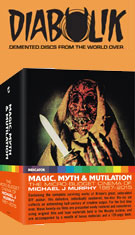
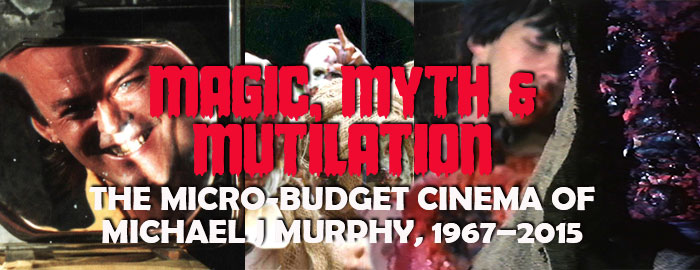


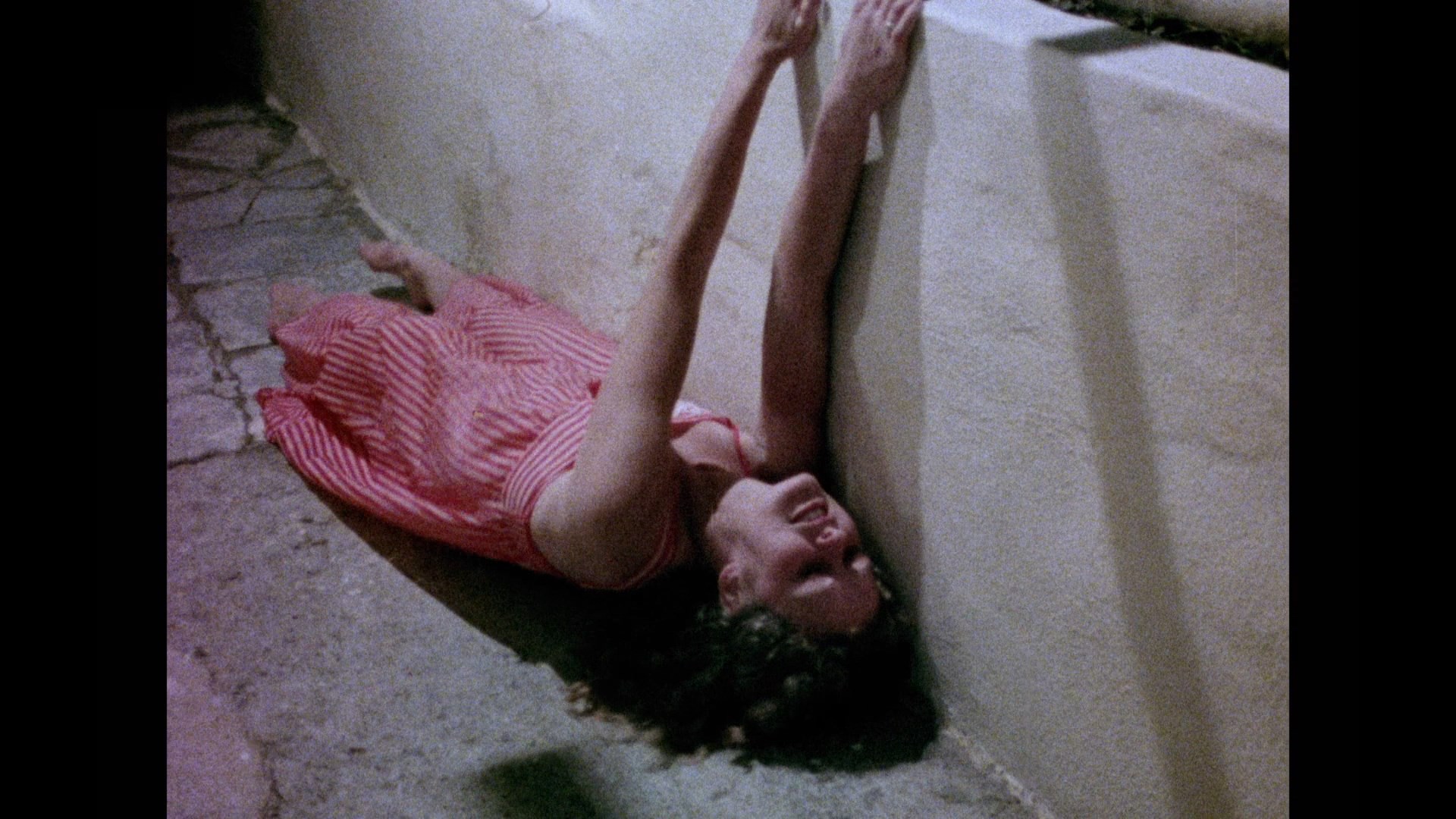 delivered the most unlikely labor of love in Blu-ray history with a sprawling ten-disc set comprising the 26 surviving Murphy films (mostly under the banner of the company he co-founded Murlyn),
delivered the most unlikely labor of love in Blu-ray history with a sprawling ten-disc set comprising the 26 surviving Murphy films (mostly under the banner of the company he co-founded Murlyn), 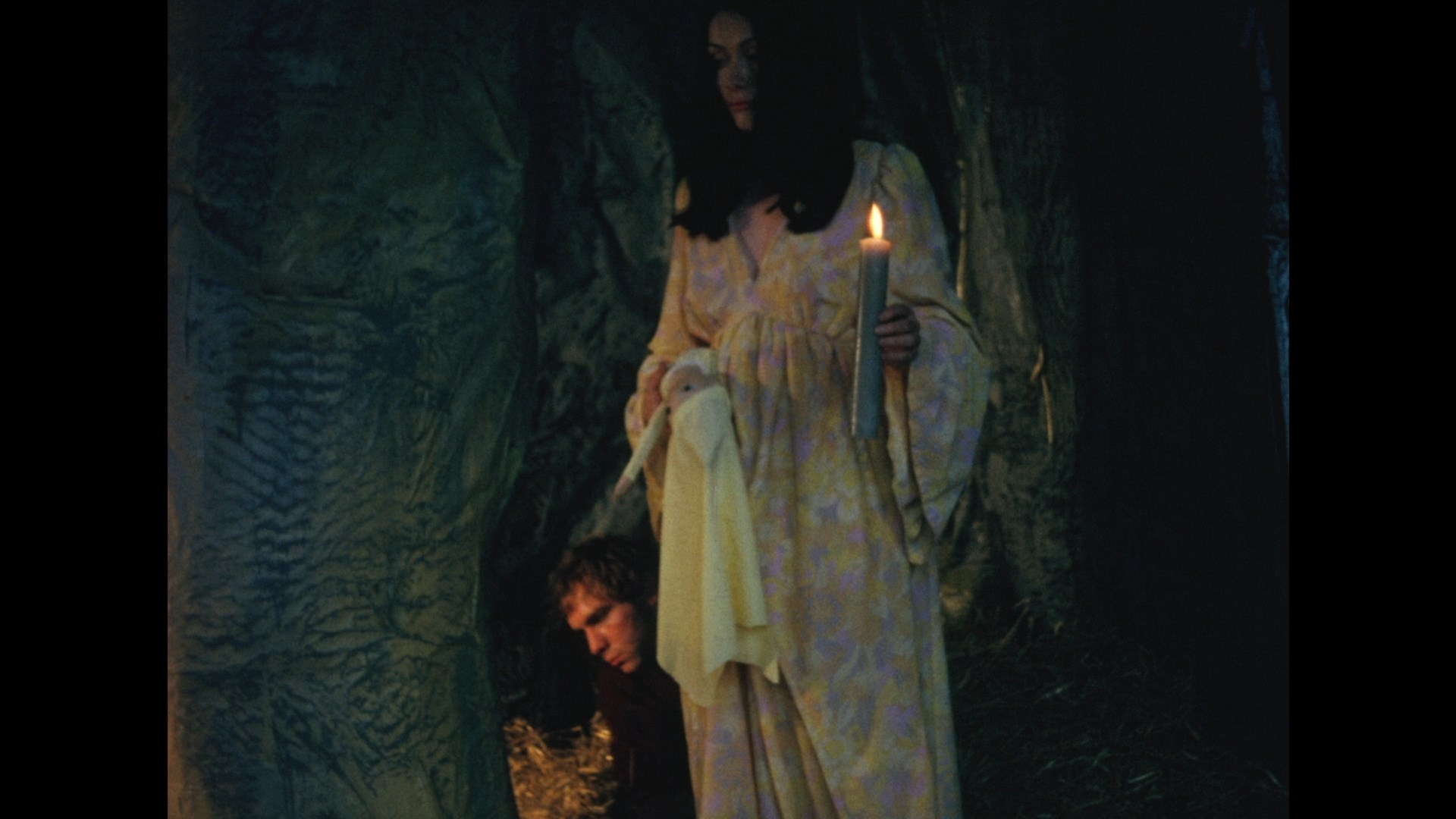 and a very comprehensive slate of bonus features shining a light on a fascinating and distinctive voice in homemade genre cinema.
and a very comprehensive slate of bonus features shining a light on a fascinating and distinctive voice in homemade genre cinema. 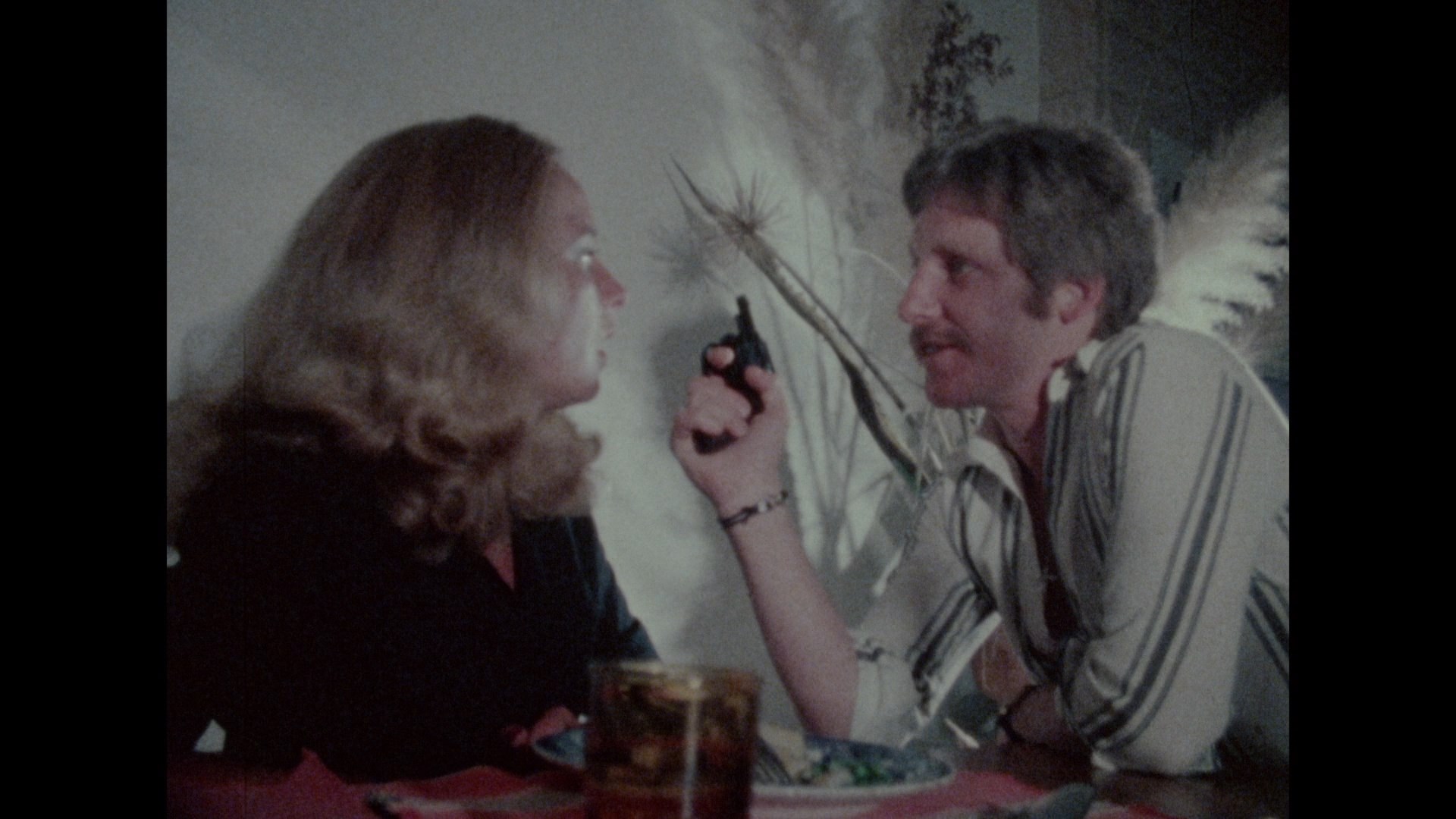 from a 2K restoration from 16mm with video inserts where necessary.
from a 2K restoration from 16mm with video inserts where necessary.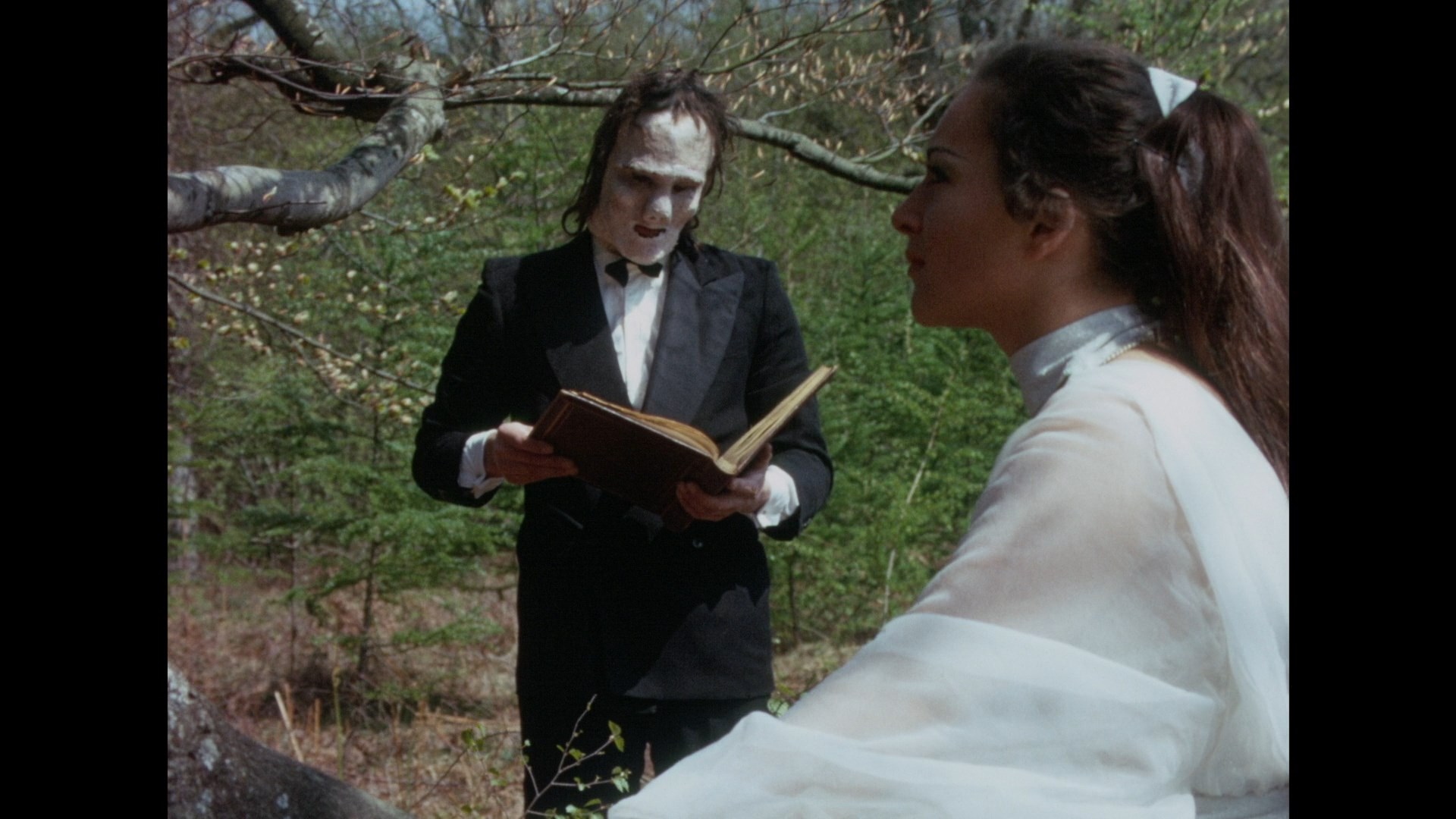 island psychodrama about a young caregiver, Vicki, who impulsively tosses her charge to her death down a hill. She calls in her boyfriend Steve to enjoy her new freedom and house, which leads to a quick wedding, new third wheel Liz, sightseeing, dreamy montages, and lots of treachery. Complete with a great rock-flavored soundtrack, venomous twists, and a tone similar to the Hammer thrillers still being turned out around the same time, this is probably the best choice to start with if you're doing these in disc order. Finally in 1979's Almost a Movie! (48m6s), aspiring novelist Terry is apprehensive about meeting his director father's new wife, Alexandra, a famous sex symbol actress with whom daddy was having an affair for years. Upon arrival at the couple's villa, he gets to know his new family member but starts to get agitated when his dad never shows up. Using a gun, a gag, and some rope, he ends up keeping Alexandra captive in what seems to be an attempt to force her to tell the truth while he keeps using the situation to dream up new possibilities for his potential book. Again this one is a fun potboiler thriller with a very limited cast of characters, mostly taken from a 16mm restoration with a few shots pulled from VHS. The video extras here start with "Murphy's Lore, Part 1: Origin (21m27s)" with Murlyn co-member Phil Lyndon, actress Judith Holding (who appeared in many of his films), actor Patrick Olliver, actor Stephen Longhurst (who also produced his own films), and actress June Murphy painting a very endearing portrait of the director from his early days to his untimely death in 2015. Murphy himself also appears in extensive interview footage explaining the "J." in his name (to avoid confusion with the actor of the same name), his start in short films, his popularity at school, his early days at Elstree/ABPC, the influence of films like Hammer horrors, his fondness for catering food for his actors, and the fun but arduous shooting days on each of the productions.
That's followed by seven surviving film fragments: 1967's gory Atlantis: City of Sin (6m2s), 1968's Boadicea (5m28s), 1971's Gods and Heroes (2m31s), the first version of Seventh Day from 1976 (7m7s), 1978's Insight (3m13s), and the second version of Seventh Day from 1979 (5m7s) and its outtakes (2m11s). Finally you get a
65-image gallery covering all the films on the disc.
island psychodrama about a young caregiver, Vicki, who impulsively tosses her charge to her death down a hill. She calls in her boyfriend Steve to enjoy her new freedom and house, which leads to a quick wedding, new third wheel Liz, sightseeing, dreamy montages, and lots of treachery. Complete with a great rock-flavored soundtrack, venomous twists, and a tone similar to the Hammer thrillers still being turned out around the same time, this is probably the best choice to start with if you're doing these in disc order. Finally in 1979's Almost a Movie! (48m6s), aspiring novelist Terry is apprehensive about meeting his director father's new wife, Alexandra, a famous sex symbol actress with whom daddy was having an affair for years. Upon arrival at the couple's villa, he gets to know his new family member but starts to get agitated when his dad never shows up. Using a gun, a gag, and some rope, he ends up keeping Alexandra captive in what seems to be an attempt to force her to tell the truth while he keeps using the situation to dream up new possibilities for his potential book. Again this one is a fun potboiler thriller with a very limited cast of characters, mostly taken from a 16mm restoration with a few shots pulled from VHS. The video extras here start with "Murphy's Lore, Part 1: Origin (21m27s)" with Murlyn co-member Phil Lyndon, actress Judith Holding (who appeared in many of his films), actor Patrick Olliver, actor Stephen Longhurst (who also produced his own films), and actress June Murphy painting a very endearing portrait of the director from his early days to his untimely death in 2015. Murphy himself also appears in extensive interview footage explaining the "J." in his name (to avoid confusion with the actor of the same name), his start in short films, his popularity at school, his early days at Elstree/ABPC, the influence of films like Hammer horrors, his fondness for catering food for his actors, and the fun but arduous shooting days on each of the productions.
That's followed by seven surviving film fragments: 1967's gory Atlantis: City of Sin (6m2s), 1968's Boadicea (5m28s), 1971's Gods and Heroes (2m31s), the first version of Seventh Day from 1976 (7m7s), 1978's Insight (3m13s), and the second version of Seventh Day from 1979 (5m7s) and its outtakes (2m11s). Finally you get a
65-image gallery covering all the films on the disc.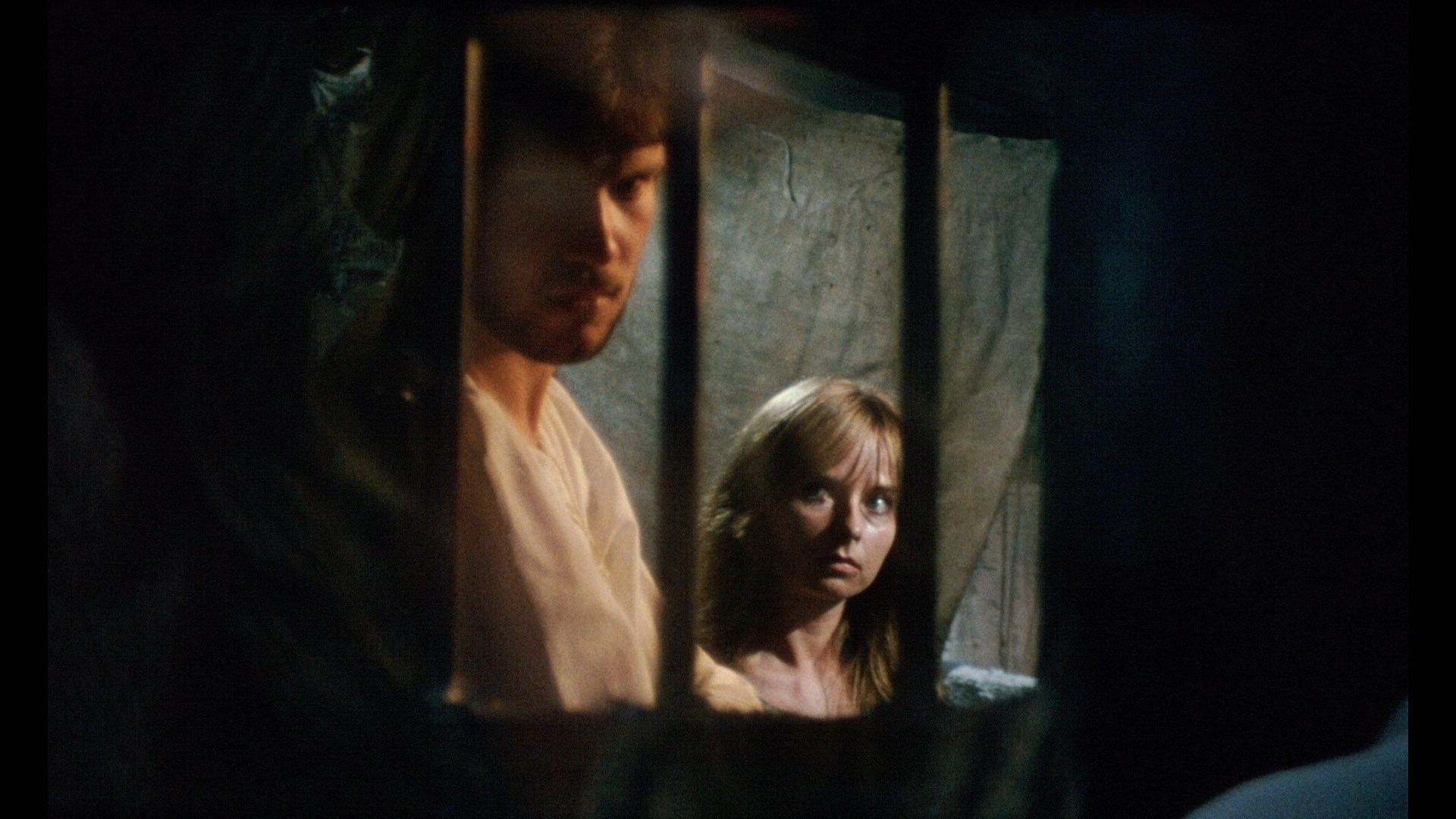 Things kick into high gear on disc two with Murphy's two most familiar titles as well as the emergence of one of his most consistent ongoing visual signatures: photogenic brown-haired guys who frequently take off their shirts. That aspect might invite comparisons to directors like Andy
Things kick into high gear on disc two with Murphy's two most familiar titles as well as the emergence of one of his most consistent ongoing visual signatures: photogenic brown-haired guys who frequently take off their shirts. That aspect might invite comparisons to directors like Andy 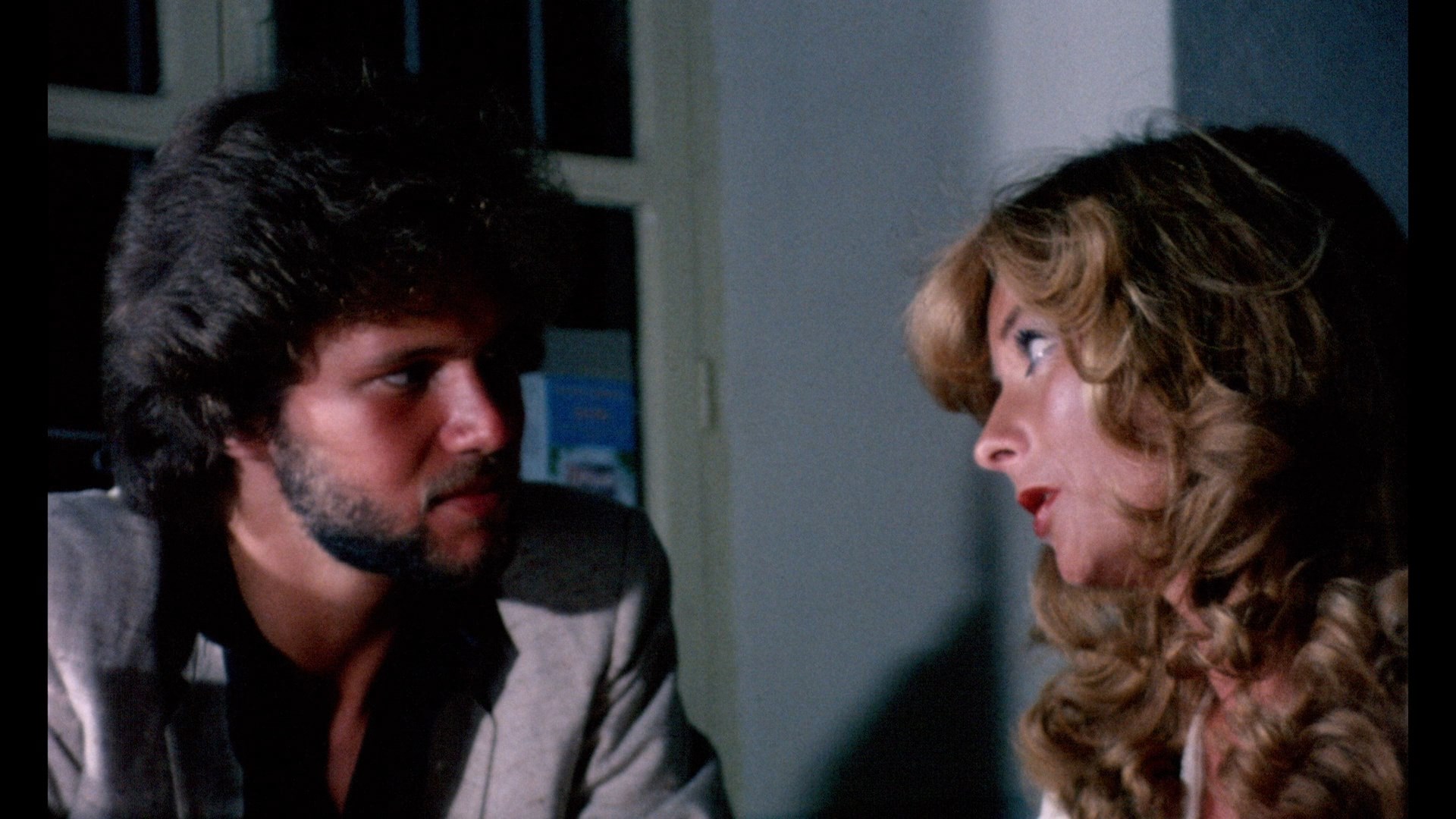 Milligan or David DeCoteau, though Murphy's approach is generally less sexualized; in fact, his love scenes tend to be very coy, and the beefcake shots have more of an innocent air about them. In the case of this disc the primary common denominator in all but one title is Russell Hall, a young actor whose four Murphy feature appearances here (plus the incomplete Seventh Day) comprise his entire screen career. First up is the 1980 short film The Cell (13m38s) in which a nameless medieval prisoner (Hall) is visited the night before his execution by a prostitute (Carol Aston), a common practice for condemned men. However, he shows no sexual interest and protests his innocence as they share their stories, during which she reveals that she has her own homicidal secret. The sort-of twist ending falls pretty flat, but otherwise this is a fairly solid two-hander with a nicely grim mood. The 1.66:1 HD transfer for this rarity looks fine, too. Also noteworthy is the soundtrack's use of Béla Bartók's "Music for Strings, Percussion, and Celesta," employed to much more famous effect the same year in Stanley Kubrick's The Shining.
Milligan or David DeCoteau, though Murphy's approach is generally less sexualized; in fact, his love scenes tend to be very coy, and the beefcake shots have more of an innocent air about them. In the case of this disc the primary common denominator in all but one title is Russell Hall, a young actor whose four Murphy feature appearances here (plus the incomplete Seventh Day) comprise his entire screen career. First up is the 1980 short film The Cell (13m38s) in which a nameless medieval prisoner (Hall) is visited the night before his execution by a prostitute (Carol Aston), a common practice for condemned men. However, he shows no sexual interest and protests his innocence as they share their stories, during which she reveals that she has her own homicidal secret. The sort-of twist ending falls pretty flat, but otherwise this is a fairly solid two-hander with a nicely grim mood. The 1.66:1 HD transfer for this rarity looks fine, too. Also noteworthy is the soundtrack's use of Béla Bartók's "Music for Strings, Percussion, and Celesta," employed to much more famous effect the same year in Stanley Kubrick's The Shining. 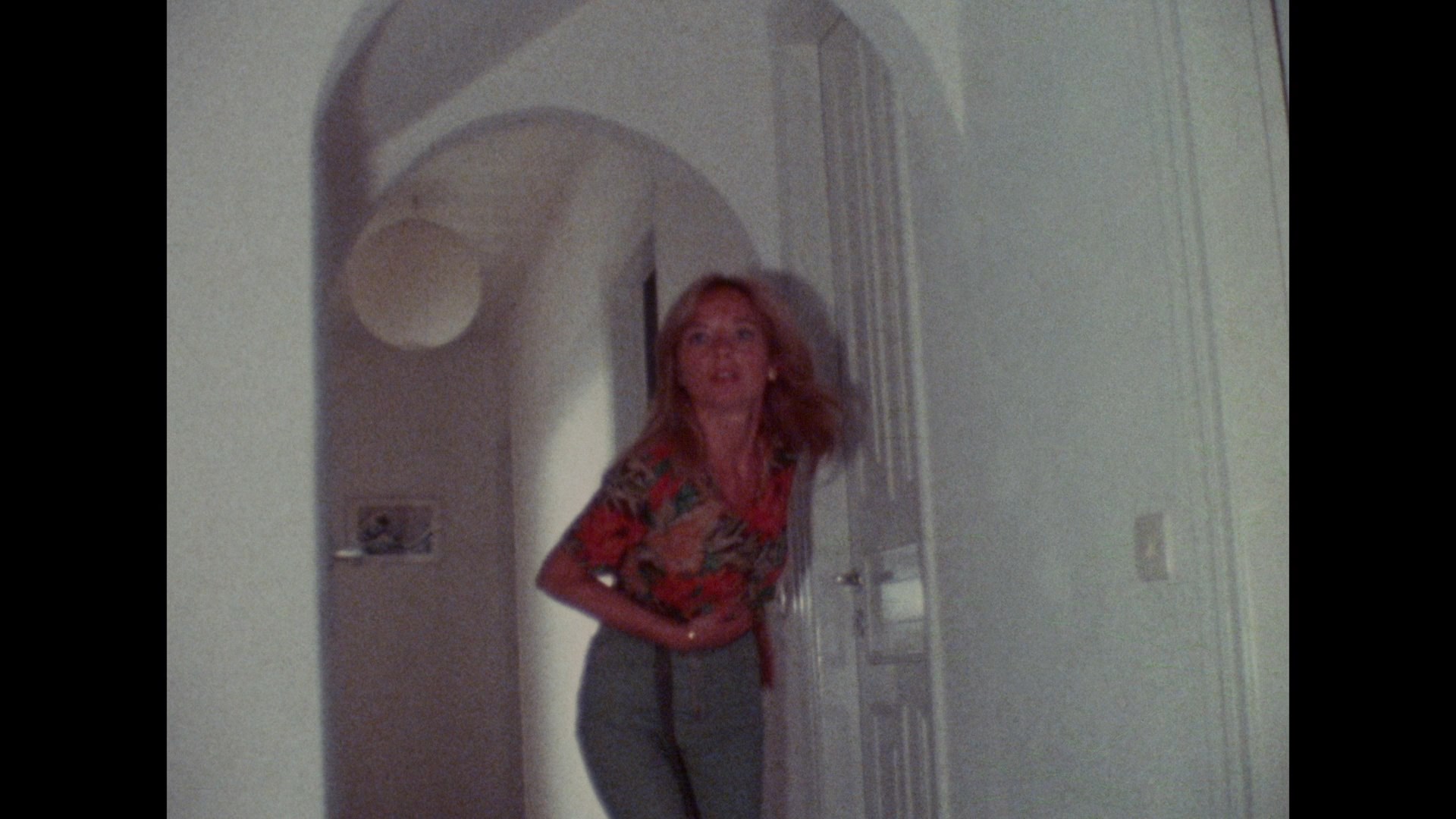 Hall and Aston pair up again for the same year's Stay (58m29s), a tragic romance returning use to the Greece where married landlady Gill is at first put off by her new tenant, wannabe composer Paul, including his habit of blasting classical music in the middle of the night. However, soon the two are hitting it off and developing a relationship with a dark secret awaiting them. Again this one features a nice 2K transfer framed at 1.66:1 (with brief VHS inserts), and it's a melancholy little drama showing
Hall and Aston pair up again for the same year's Stay (58m29s), a tragic romance returning use to the Greece where married landlady Gill is at first put off by her new tenant, wannabe composer Paul, including his habit of blasting classical music in the middle of the night. However, soon the two are hitting it off and developing a relationship with a dark secret awaiting them. Again this one features a nice 2K transfer framed at 1.66:1 (with brief VHS inserts), and it's a melancholy little drama showing 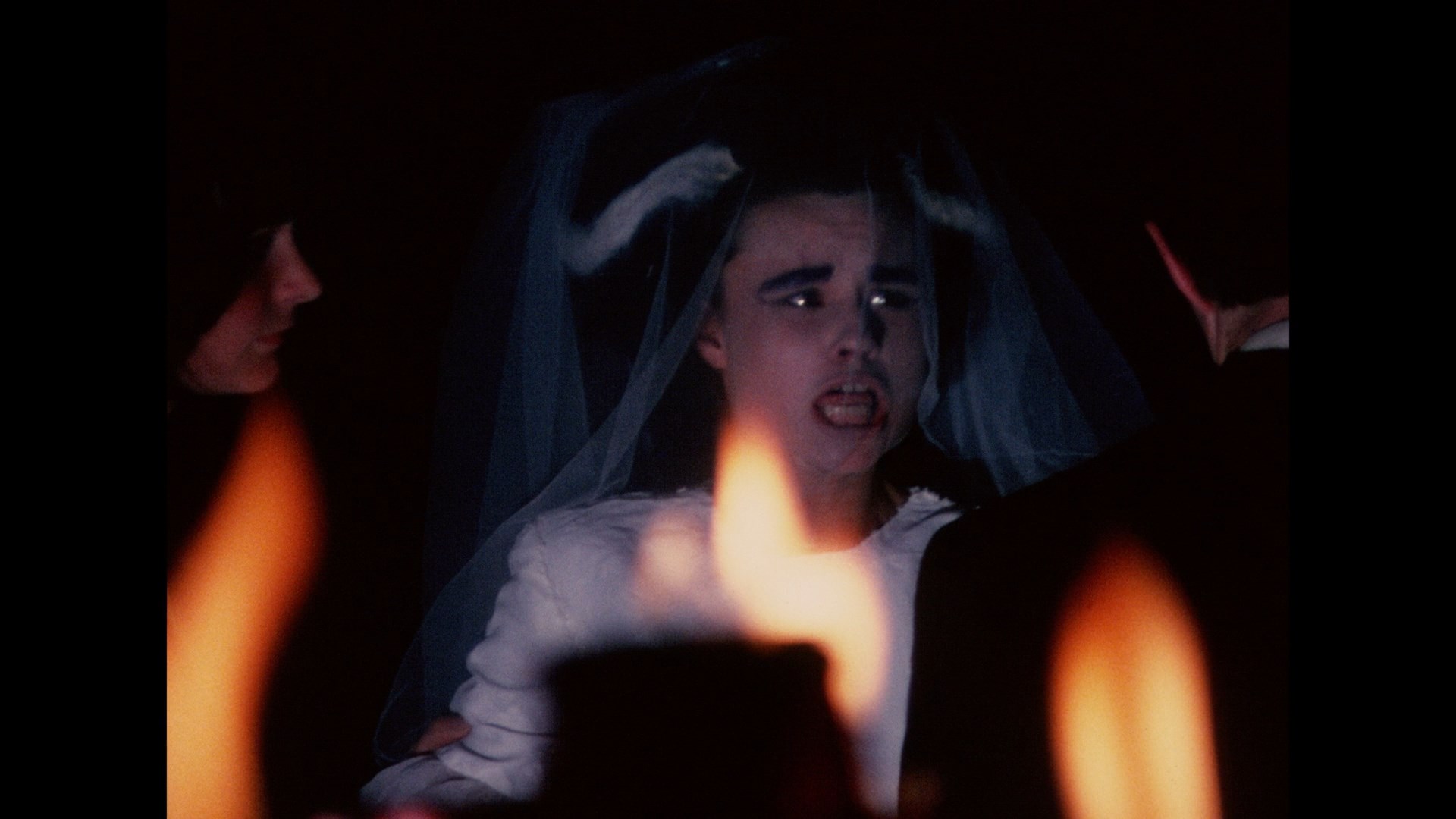 off Murphy's eye for Greek isle scenery again. Then we move to another short feature, 1981's Death in the Family (54m51s), which actually does feel a bit like a more subdued Milligan film and got a U.K. VHS release back in the day from Neon. Oliver (Hall) welcomes several of his relatives to the family villa for a reunion including sister Debbie (Caroline Aylward), with whom he has an incestuous relationship, to meet the new stepmother, Shirley (Aston). It's been five years since the death of Oliver's mom in a fiery car accident, and he's still working through major trauma issues while his dad Max works on building a new marina. Soon hidden agendas rise to the surface as Oliver and Debbie's dark side begins to take over. Though it starts off slow, this one is pure Murphy with its double- and triple-crossing characters, languid Greek island locale, and utterly cuckoo climax that's best experienced unspoiled. The 2K 16mm restoration (with a couple of very fleeting VHS inserts) is framed at 1.33:1 and looks solid while preserving the scrappy nature of the original film.
off Murphy's eye for Greek isle scenery again. Then we move to another short feature, 1981's Death in the Family (54m51s), which actually does feel a bit like a more subdued Milligan film and got a U.K. VHS release back in the day from Neon. Oliver (Hall) welcomes several of his relatives to the family villa for a reunion including sister Debbie (Caroline Aylward), with whom he has an incestuous relationship, to meet the new stepmother, Shirley (Aston). It's been five years since the death of Oliver's mom in a fiery car accident, and he's still working through major trauma issues while his dad Max works on building a new marina. Soon hidden agendas rise to the surface as Oliver and Debbie's dark side begins to take over. Though it starts off slow, this one is pure Murphy with its double- and triple-crossing characters, languid Greek island locale, and utterly cuckoo climax that's best experienced unspoiled. The 2K 16mm restoration (with a couple of very fleeting VHS inserts) is framed at 1.33:1 and looks solid while preserving the scrappy nature of the original film. 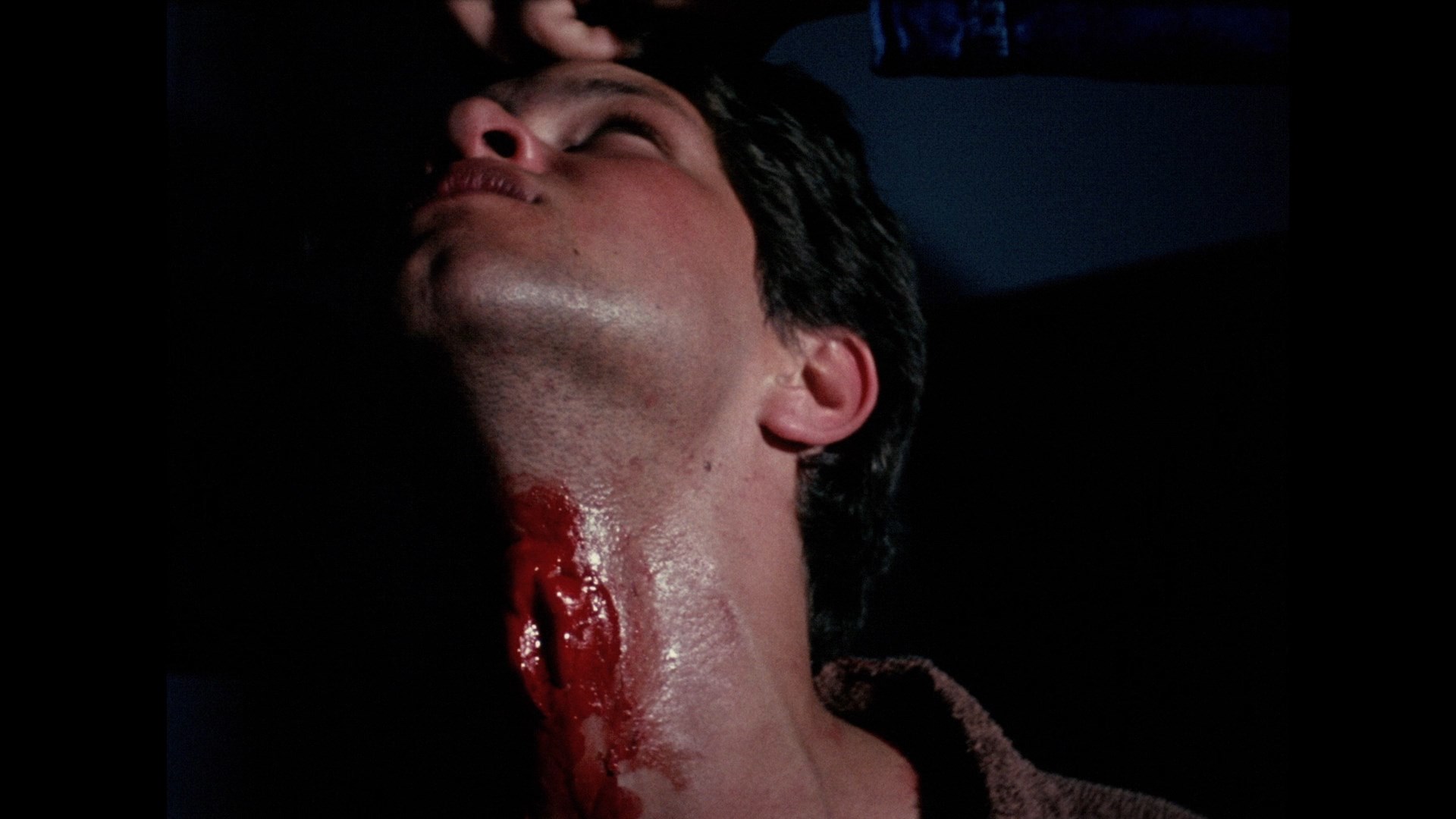 is a delirious and very entertaining combination of occult and slasher thrills as Jacky (Becky Simpson) is invited to a country house for a weekend party. Everyone turns out to be decked out in costumes, so she's provided with a Bride of Frankenstein wig for an evening she can't quite remember. The next day, she's forbidden from leaving as it turns out she's been
is a delirious and very entertaining combination of occult and slasher thrills as Jacky (Becky Simpson) is invited to a country house for a weekend party. Everyone turns out to be decked out in costumes, so she's provided with a Bride of Frankenstein wig for an evening she can't quite remember. The next day, she's forbidden from leaving as it turns out she's been 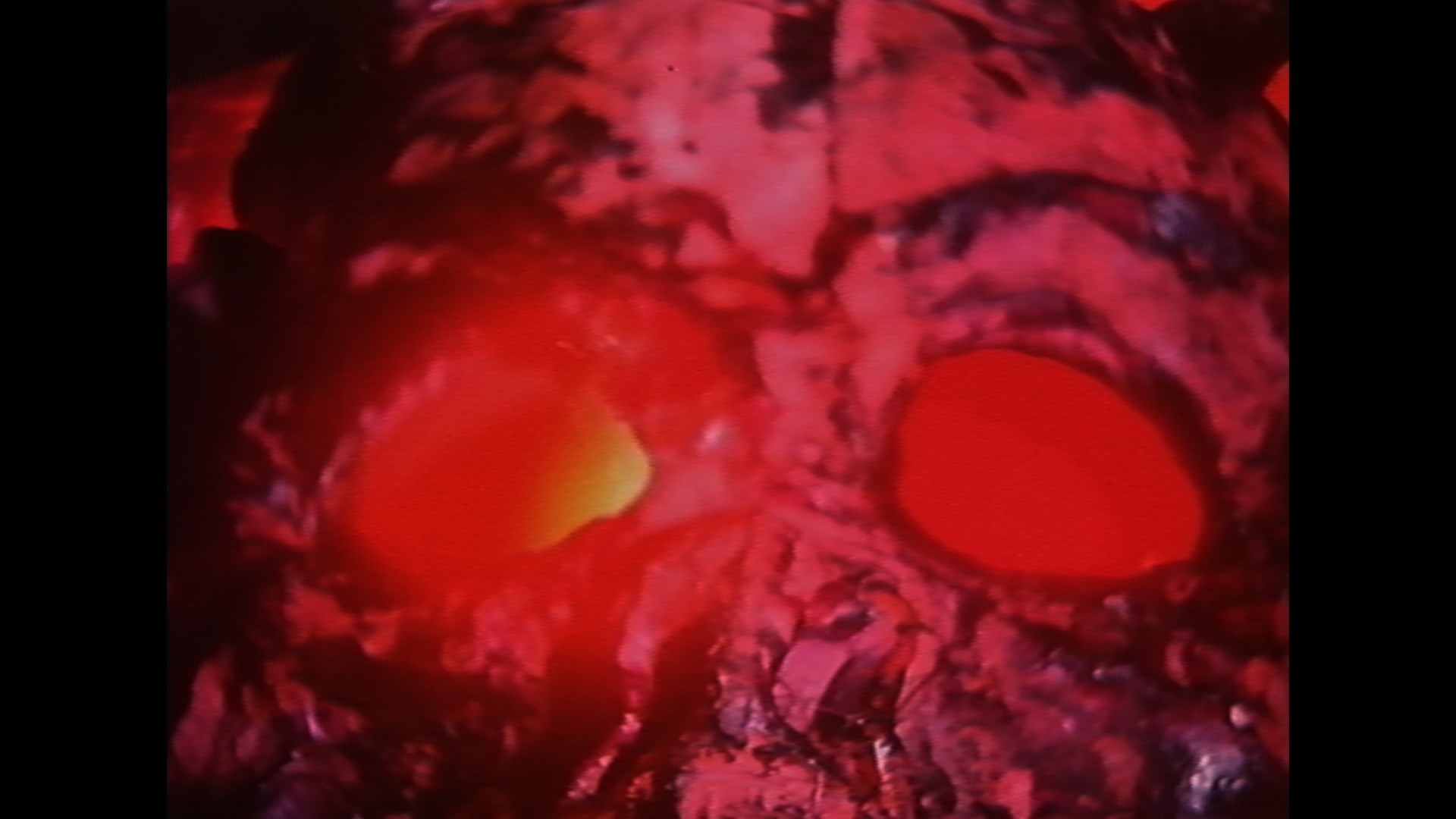 roped into a pagan with some weird customers like mute, homicidal handyman Maurice (Colin Efford) who practices shirtless weightlifting while staring at nudie pinups on his wall. Hall turns up here again in a much smaller role, with Efford getting the most memorable part here. It's a very memorable film that turns some wild turns on the way to its vivid, gut-ripping demonic finale, with a few effective stalk-and-slash kills sprinkled in along the way. The droning electronic score is a big plus as well, making this an easy recommendation for fans of '80s British horror. The 1.33:1 presentation is mostly taken from a 2K 16mm restoration, though unfortunately no film elements exist for the last 10 minutes which are pulled from tape. There's an option to view either the original version or a revised 2008 one prepared for the film's 2008 Sarcophilous Films DVD edition, which completes some of the red eye special effects in the final stretch. The companion film, The Last Night (46m36s), is a more straightforward slasher as the final night of a theatrical production called Murder in the Dark gets crashed by a couple of "armed and extremely dangerous" convicts escaped from nearby Broadmoor prison. Soon people are getting snatched, throats are slashed,
roped into a pagan with some weird customers like mute, homicidal handyman Maurice (Colin Efford) who practices shirtless weightlifting while staring at nudie pinups on his wall. Hall turns up here again in a much smaller role, with Efford getting the most memorable part here. It's a very memorable film that turns some wild turns on the way to its vivid, gut-ripping demonic finale, with a few effective stalk-and-slash kills sprinkled in along the way. The droning electronic score is a big plus as well, making this an easy recommendation for fans of '80s British horror. The 1.33:1 presentation is mostly taken from a 2K 16mm restoration, though unfortunately no film elements exist for the last 10 minutes which are pulled from tape. There's an option to view either the original version or a revised 2008 one prepared for the film's 2008 Sarcophilous Films DVD edition, which completes some of the red eye special effects in the final stretch. The companion film, The Last Night (46m36s), is a more straightforward slasher as the final night of a theatrical production called Murder in the Dark gets crashed by a couple of "armed and extremely dangerous" convicts escaped from nearby Broadmoor prison. Soon people are getting snatched, throats are slashed, 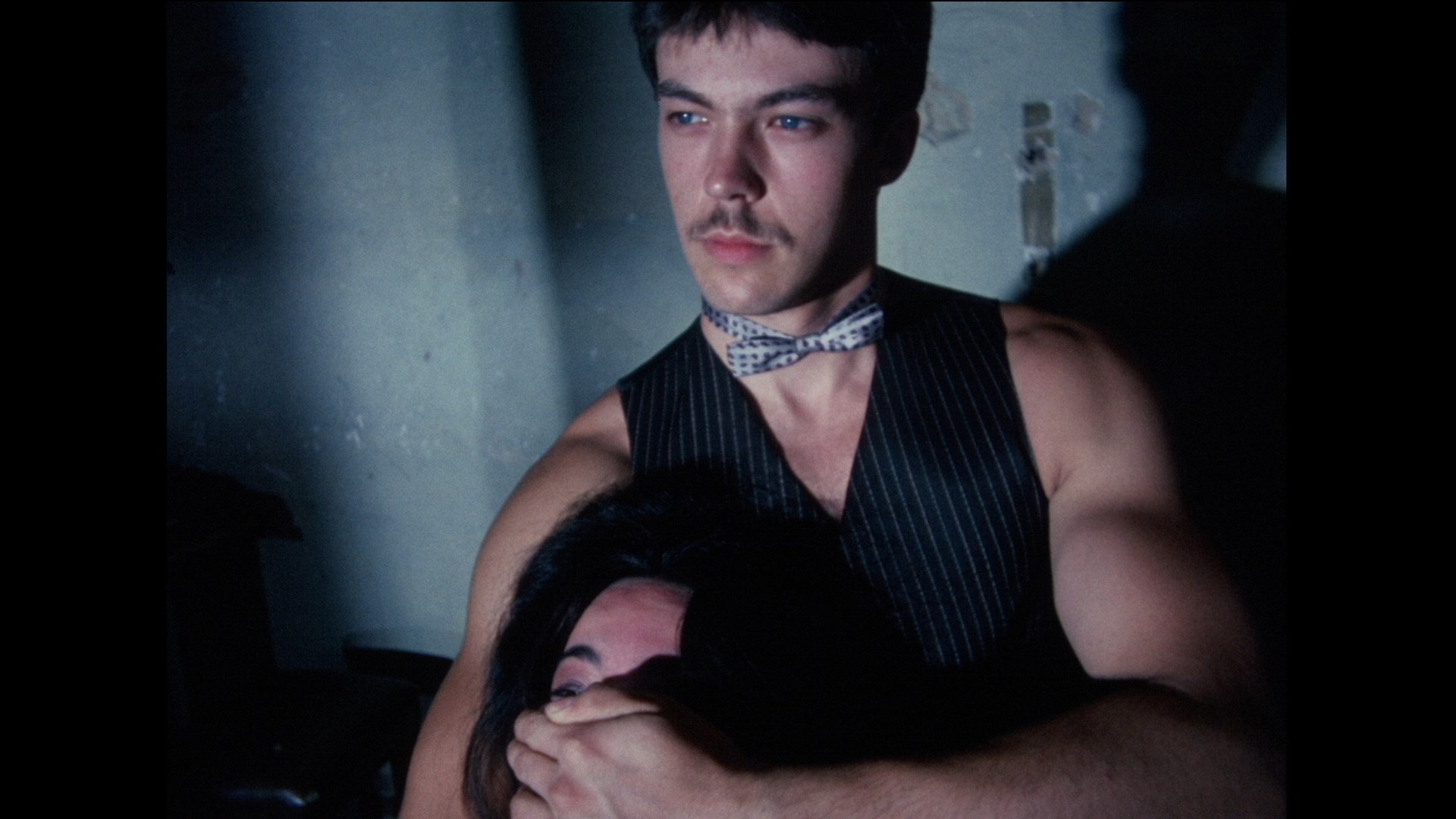 and the convicts run around shirtless while bitching at each other. It's another quick horror diversion that doesn't wear out its welcome, with another strange synth score giving it a nice amount of atmosphere to the setting reminiscent of Pete Walker's
and the convicts run around shirtless while bitching at each other. It's another quick horror diversion that doesn't wear out its welcome, with another strange synth score giving it a nice amount of atmosphere to the setting reminiscent of Pete Walker's 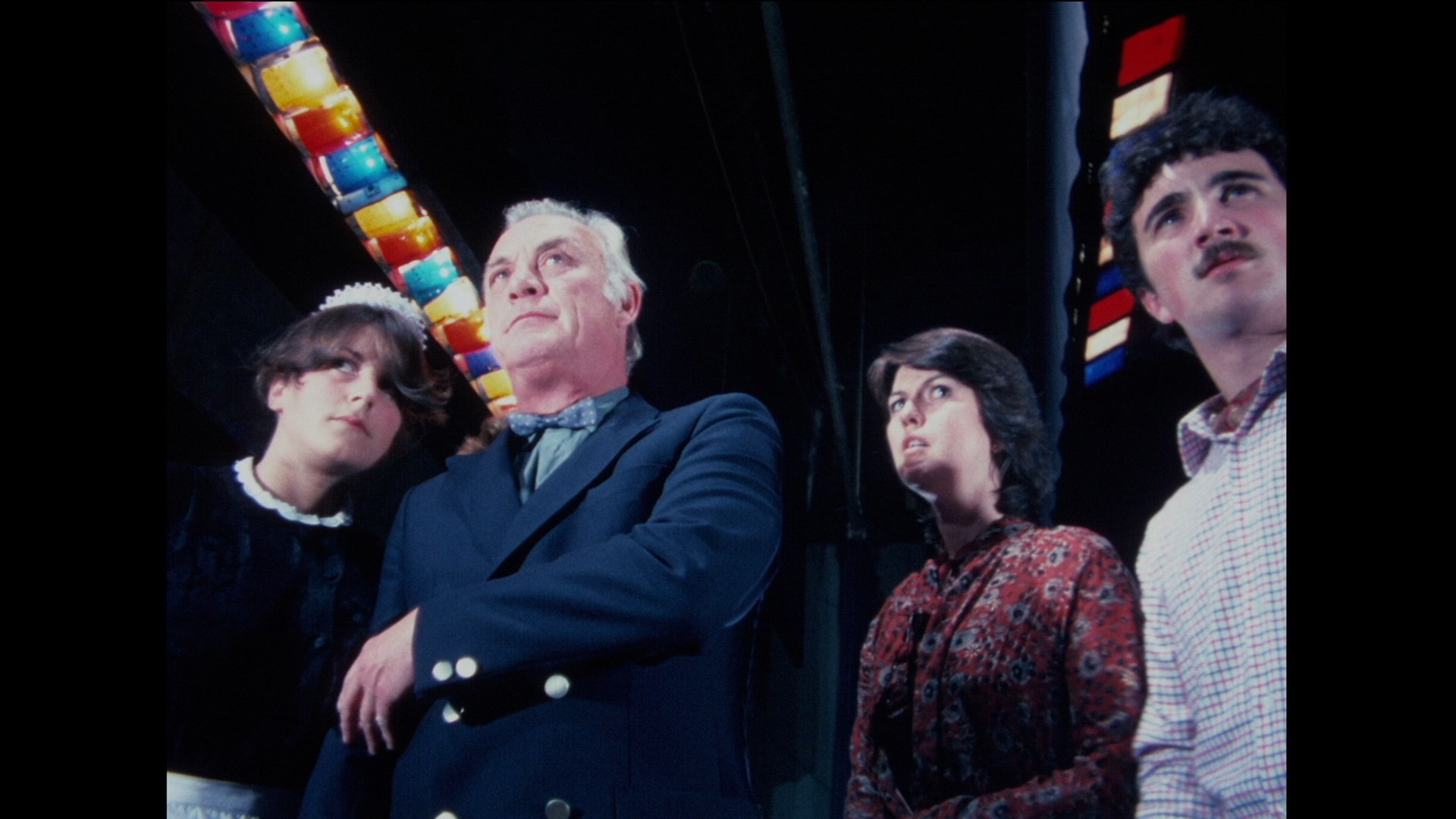 The Flesh and Blood Show. The 1.33:1 presentation here is sourced entirely from 16mm, but it has a heavy jerky motion throughout that makes it a bit of a chore to watch. There's also an option to watch the double feature in its intended order of The Last Night followed by Invitation to Hell or vice versa as presented on the Scorpio VHS release. Extras include two Invitation to Hell commentaries (one from the 2008 DVD by Murphy, Lyndon, and Sally Duncan, and a new 2022 one by Johnny Walker) and the 2008 DVD commentary for The Last Night by Murphy, Lyndon, and Duncan. You also get a making-of from the DVD for the double feature (15m) presented by Murphy, alternative 2008 credits from the DVD for The Last Night, a 2m29s reel of VHS-sourced outtakes from Stay, a 3m6s stereo presentation of the theme song from Stay, reissue trailers for the two horror films separately and together, a 2m12s reel of 1982 "Custom Video" logos by Murphy for his own short-lived VHS label, a 69-image gallery covered all the disc two films, and an Invitation to Hell script gallery.
The Flesh and Blood Show. The 1.33:1 presentation here is sourced entirely from 16mm, but it has a heavy jerky motion throughout that makes it a bit of a chore to watch. There's also an option to watch the double feature in its intended order of The Last Night followed by Invitation to Hell or vice versa as presented on the Scorpio VHS release. Extras include two Invitation to Hell commentaries (one from the 2008 DVD by Murphy, Lyndon, and Sally Duncan, and a new 2022 one by Johnny Walker) and the 2008 DVD commentary for The Last Night by Murphy, Lyndon, and Duncan. You also get a making-of from the DVD for the double feature (15m) presented by Murphy, alternative 2008 credits from the DVD for The Last Night, a 2m29s reel of VHS-sourced outtakes from Stay, a 3m6s stereo presentation of the theme song from Stay, reissue trailers for the two horror films separately and together, a 2m12s reel of 1982 "Custom Video" logos by Murphy for his own short-lived VHS label, a 69-image gallery covered all the disc two films, and an Invitation to Hell script gallery. 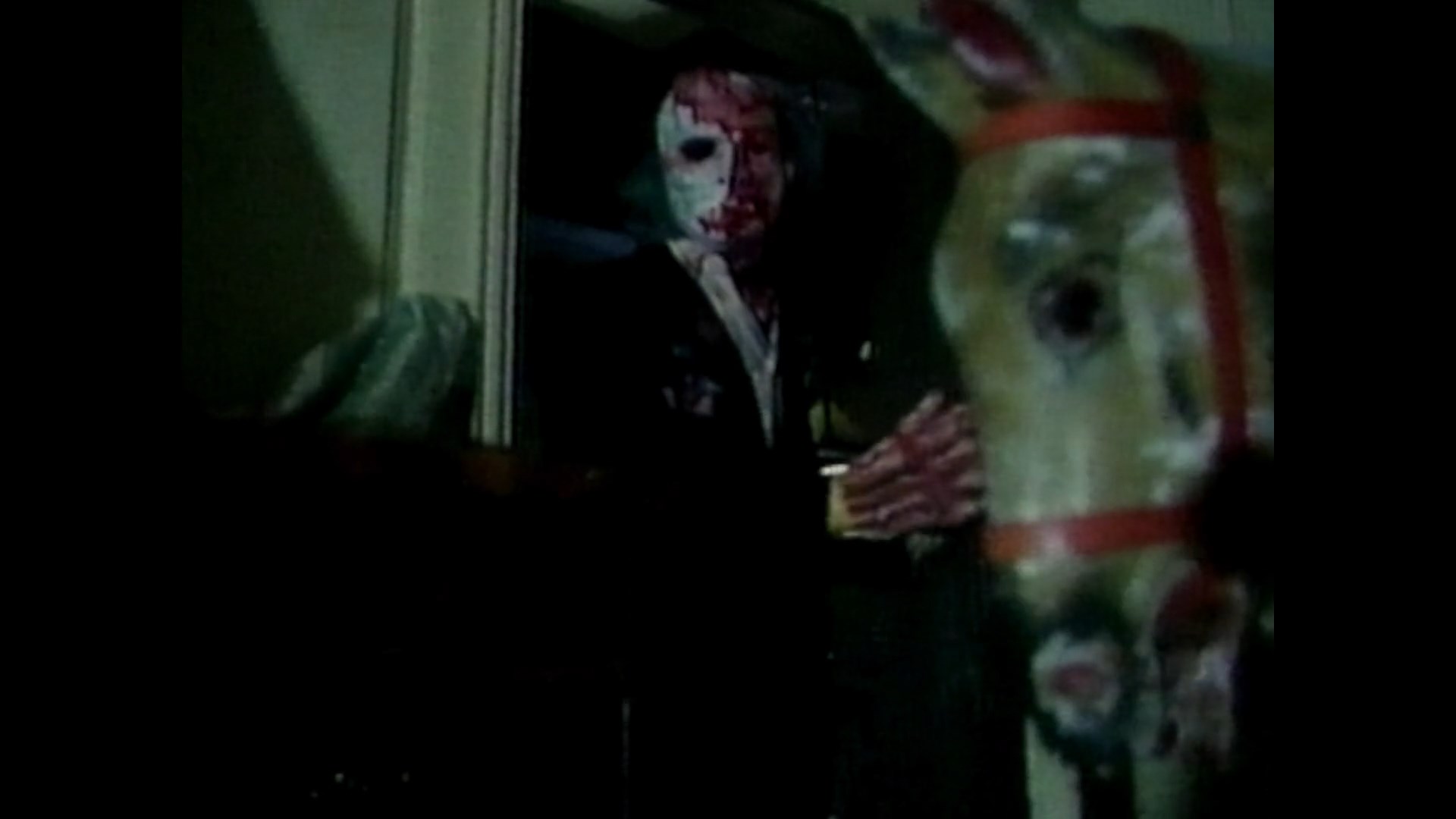 from its Mogul release.
from its Mogul release. 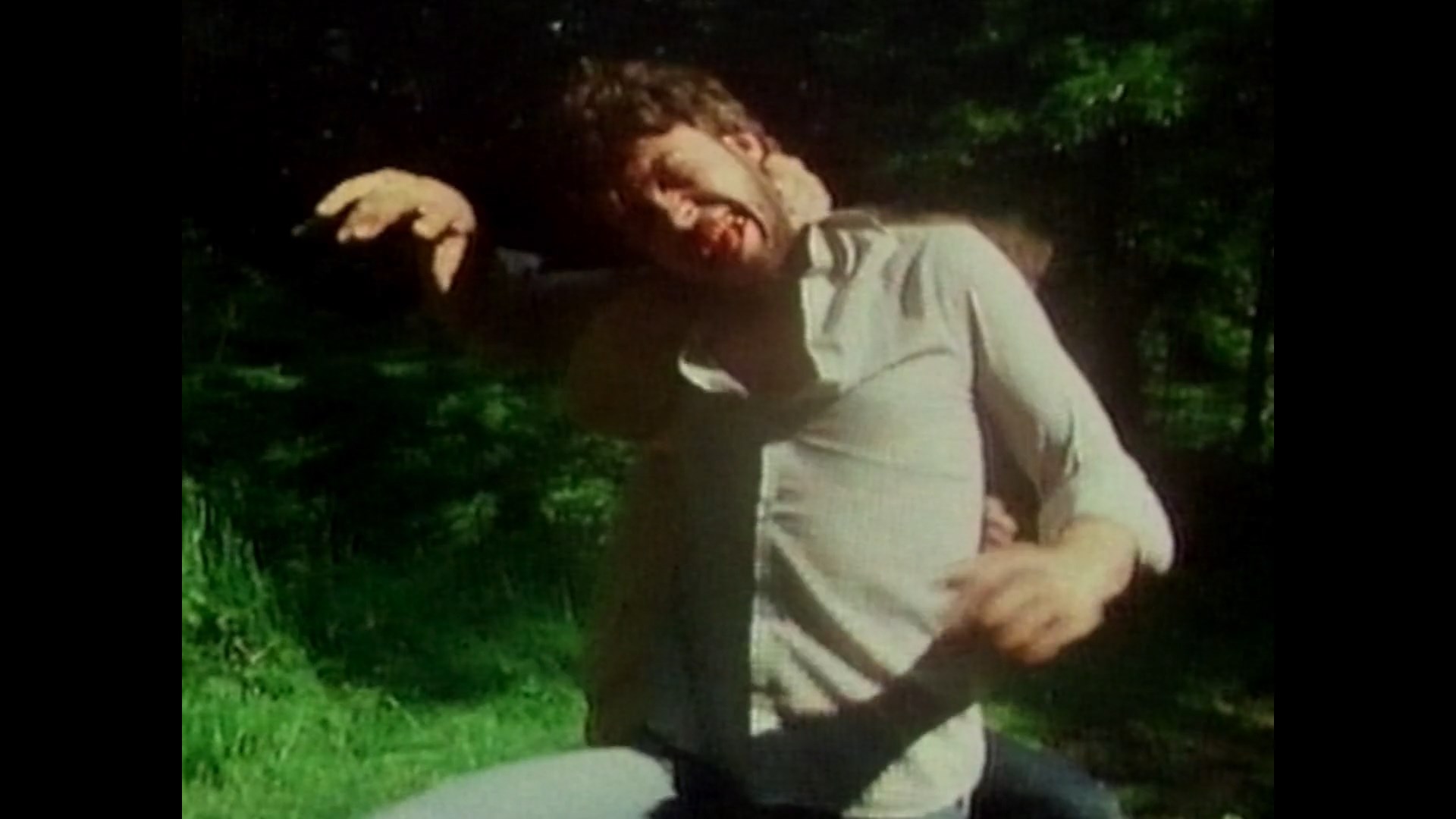 Neville (Steven Longhurst) is all set to inherit the lavish country estate of his grumpy, wheelchair-bound widower dad (Al Greer) who disapproves of his son's romance with "that hairdresser slut," Vicky (Renée Soutendijk lookalike "Catherine Rowlands," really Caroline Macdowell and a.k.a. "Caroline Aylward"). After a particularly nasty argument during an afternoon stroll, Neville storms off to leave dad careening over a ditch and into a lake. Vicky's more than pleased at the development, but unfortunately dad's will specifies that Neville has to keep and maintain the estate; if he tries to sell it, the property gets divided among his other relatives. As Neville soon reveals, the house has a history of nasty deaths and deceptions, all of which soon seem to be coming into play as the new domestic situation turns into a succession of night terrors. The Hammer influence is especially strong in this horror-frosted redo of Secrets (right down to the similar ending) including a flashback inspired by The Curse of the Werewolf and a succession of "is it supernatural or gaslighting?" plot developments interspersed with a murder or two. Toss in another costume party, some rinky-dink disco music, a random TV screening of The Cell, and obligatory male eye candy supplied by Colin Efford (credited as David Slater) as the suspicious groundskeeper, and it's more Murphy fun all the way. It's unlikely anyone was actually scared by this one, but you can't have everything. Unfortunately there are no surviving film elements for this one so you get it straight from a standard def tape source, playable with either its U.K. or U.S. title.
Neville (Steven Longhurst) is all set to inherit the lavish country estate of his grumpy, wheelchair-bound widower dad (Al Greer) who disapproves of his son's romance with "that hairdresser slut," Vicky (Renée Soutendijk lookalike "Catherine Rowlands," really Caroline Macdowell and a.k.a. "Caroline Aylward"). After a particularly nasty argument during an afternoon stroll, Neville storms off to leave dad careening over a ditch and into a lake. Vicky's more than pleased at the development, but unfortunately dad's will specifies that Neville has to keep and maintain the estate; if he tries to sell it, the property gets divided among his other relatives. As Neville soon reveals, the house has a history of nasty deaths and deceptions, all of which soon seem to be coming into play as the new domestic situation turns into a succession of night terrors. The Hammer influence is especially strong in this horror-frosted redo of Secrets (right down to the similar ending) including a flashback inspired by The Curse of the Werewolf and a succession of "is it supernatural or gaslighting?" plot developments interspersed with a murder or two. Toss in another costume party, some rinky-dink disco music, a random TV screening of The Cell, and obligatory male eye candy supplied by Colin Efford (credited as David Slater) as the suspicious groundskeeper, and it's more Murphy fun all the way. It's unlikely anyone was actually scared by this one, but you can't have everything. Unfortunately there are no surviving film elements for this one so you get it straight from a standard def tape source, playable with either its U.K. or U.S. title. 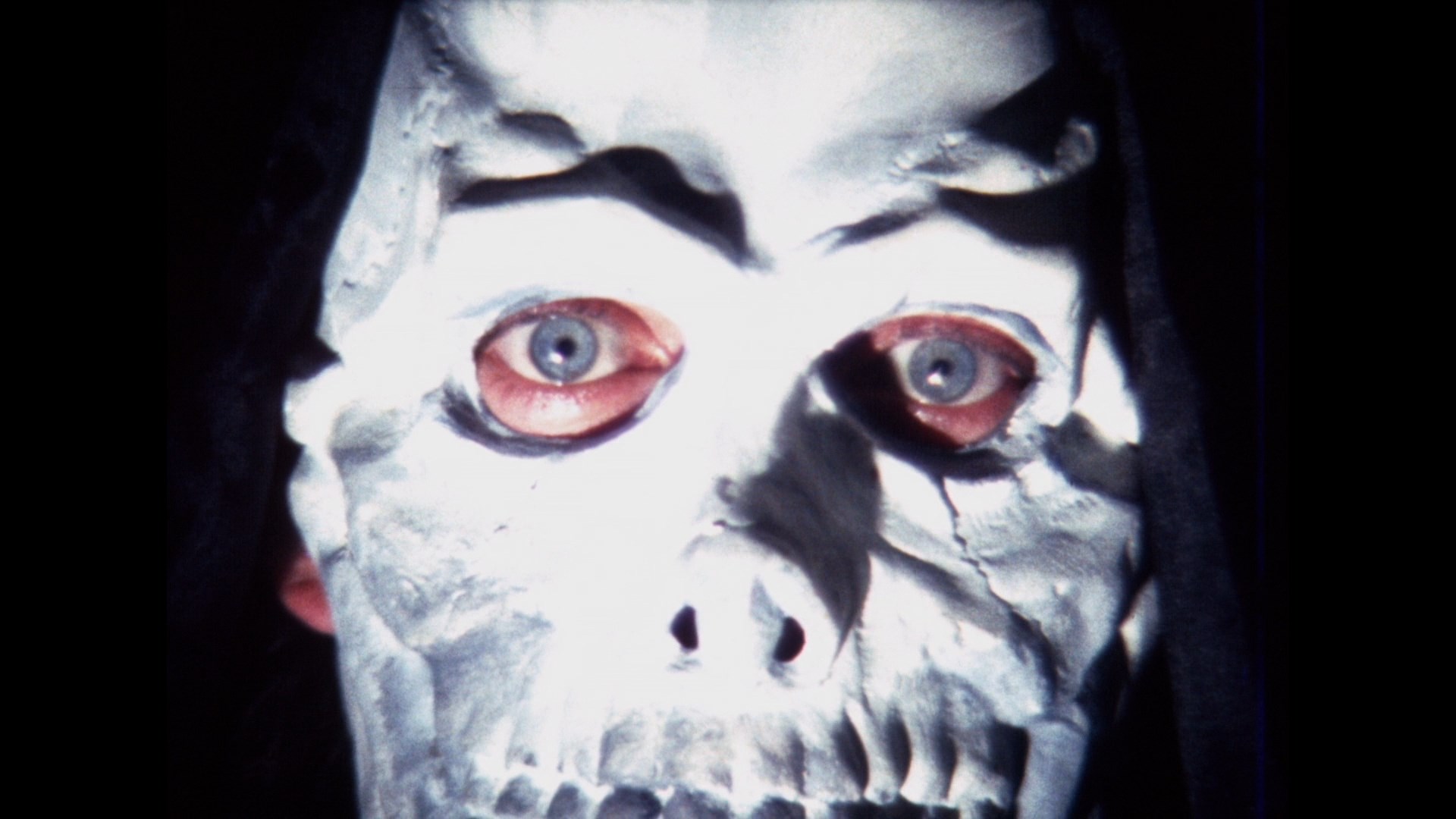 somewhat infamous films in British horror trading circles for its cynical and presumably autobiographic take
somewhat infamous films in British horror trading circles for its cynical and presumably autobiographic take 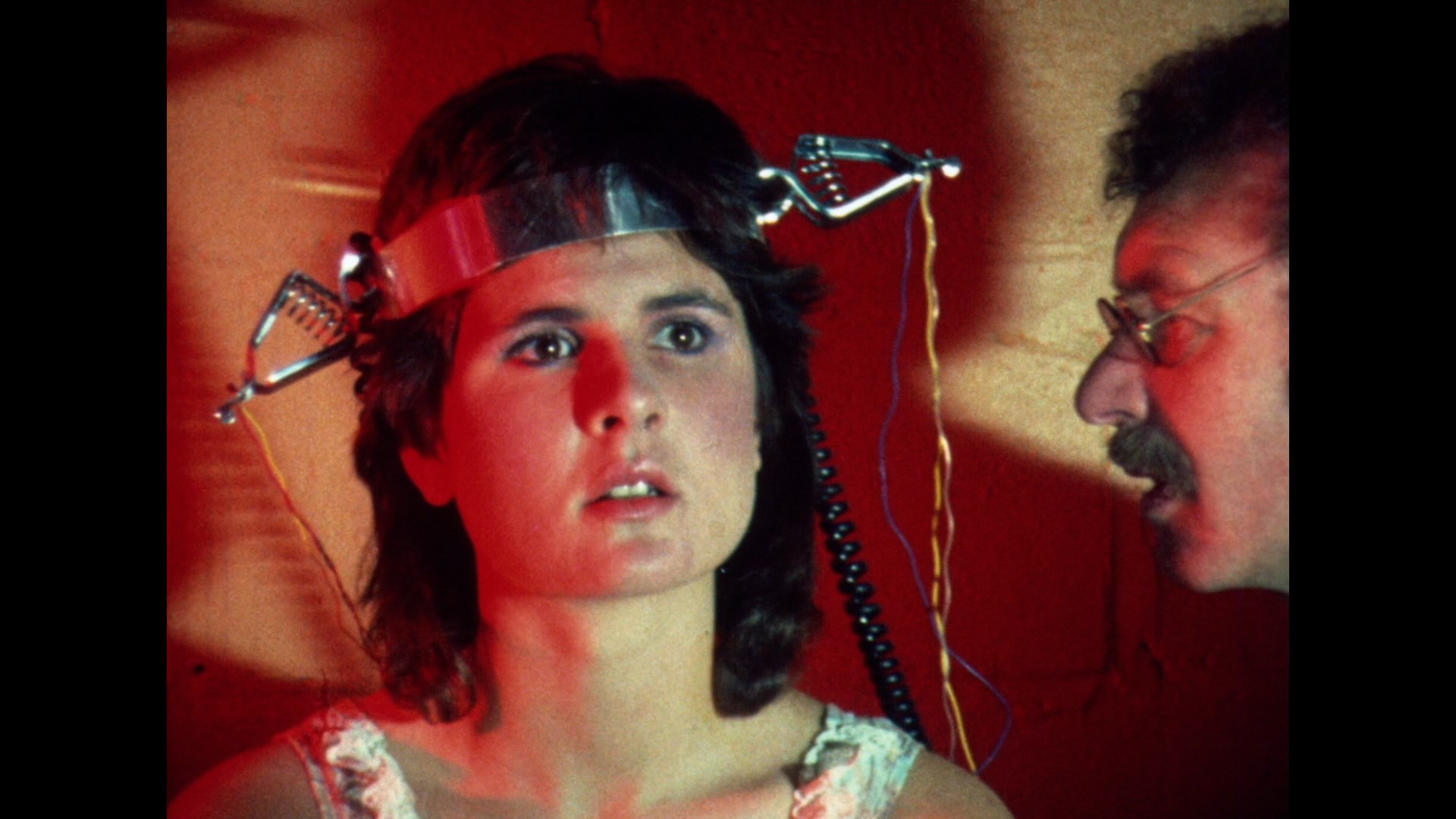 on dishonest low-budget distributors. Brutally cut out of his profit share by scumbag home video distributor William King (Mark Wells) after completing his horror film Bloodstream, director Alistair Bailey (Patrick Olliver) drowns his sorrows at home by watching gore movies until secretary Nikki (Jacqueline Logan) alerts him how much he's just been screwed. On top of that, Nikki gets plenty of additional dirt on her boss and his associates -- which is impetus enough for Alistair to slip on the costume from his latest opus and create a "sequel" killing off King and his cronies on camera for real. If you make the leap this film requires and set logic aside, it's a fascinating and sometimes outrageously gruesome meta-commentary on the poverty row side of horror movies during the ascent of the VHS era, with Murphy clearly speaking from real-life experience after the botched deals on his most recent films. Murphy himself is on record in this set as saying the Super 8 format just didn't cut it after his previous 16mm projects, but you also have to wonder if perhaps he wasn't also concerned about alienating other people in the business down the road. Some VHS-sourced bootlegs of this film have floated around for a while (including at least one unauthorized DVD), but the Indicator marks the first official release of the director's cut sourced from a 2K scan of the original Super 8 elements (featuring Murphy himself dubbing in the role of King) or the earlier bootleg version (80m47s) sourced from VHS with Wells' original voice (as well as Logan, who was also redubbed). Extras on disc three kick off with "Michael J. Murphy Presents" (18m40s), a lighthearted interview and studio tour with the director and Lyndon chatting about the rationale behind the films, the friends made along the way, and some of the more memorable press coverage. Also included are a reel of 16mm test footage (3m12s) circa 1980, a Bloodstream promo intended for an unrealized 2008 DVD release, a 28-image gallery, and script galleries for both films.
on dishonest low-budget distributors. Brutally cut out of his profit share by scumbag home video distributor William King (Mark Wells) after completing his horror film Bloodstream, director Alistair Bailey (Patrick Olliver) drowns his sorrows at home by watching gore movies until secretary Nikki (Jacqueline Logan) alerts him how much he's just been screwed. On top of that, Nikki gets plenty of additional dirt on her boss and his associates -- which is impetus enough for Alistair to slip on the costume from his latest opus and create a "sequel" killing off King and his cronies on camera for real. If you make the leap this film requires and set logic aside, it's a fascinating and sometimes outrageously gruesome meta-commentary on the poverty row side of horror movies during the ascent of the VHS era, with Murphy clearly speaking from real-life experience after the botched deals on his most recent films. Murphy himself is on record in this set as saying the Super 8 format just didn't cut it after his previous 16mm projects, but you also have to wonder if perhaps he wasn't also concerned about alienating other people in the business down the road. Some VHS-sourced bootlegs of this film have floated around for a while (including at least one unauthorized DVD), but the Indicator marks the first official release of the director's cut sourced from a 2K scan of the original Super 8 elements (featuring Murphy himself dubbing in the role of King) or the earlier bootleg version (80m47s) sourced from VHS with Wells' original voice (as well as Logan, who was also redubbed). Extras on disc three kick off with "Michael J. Murphy Presents" (18m40s), a lighthearted interview and studio tour with the director and Lyndon chatting about the rationale behind the films, the friends made along the way, and some of the more memorable press coverage. Also included are a reel of 16mm test footage (3m12s) circa 1980, a Bloodstream promo intended for an unrealized 2008 DVD release, a 28-image gallery, and script galleries for both films. 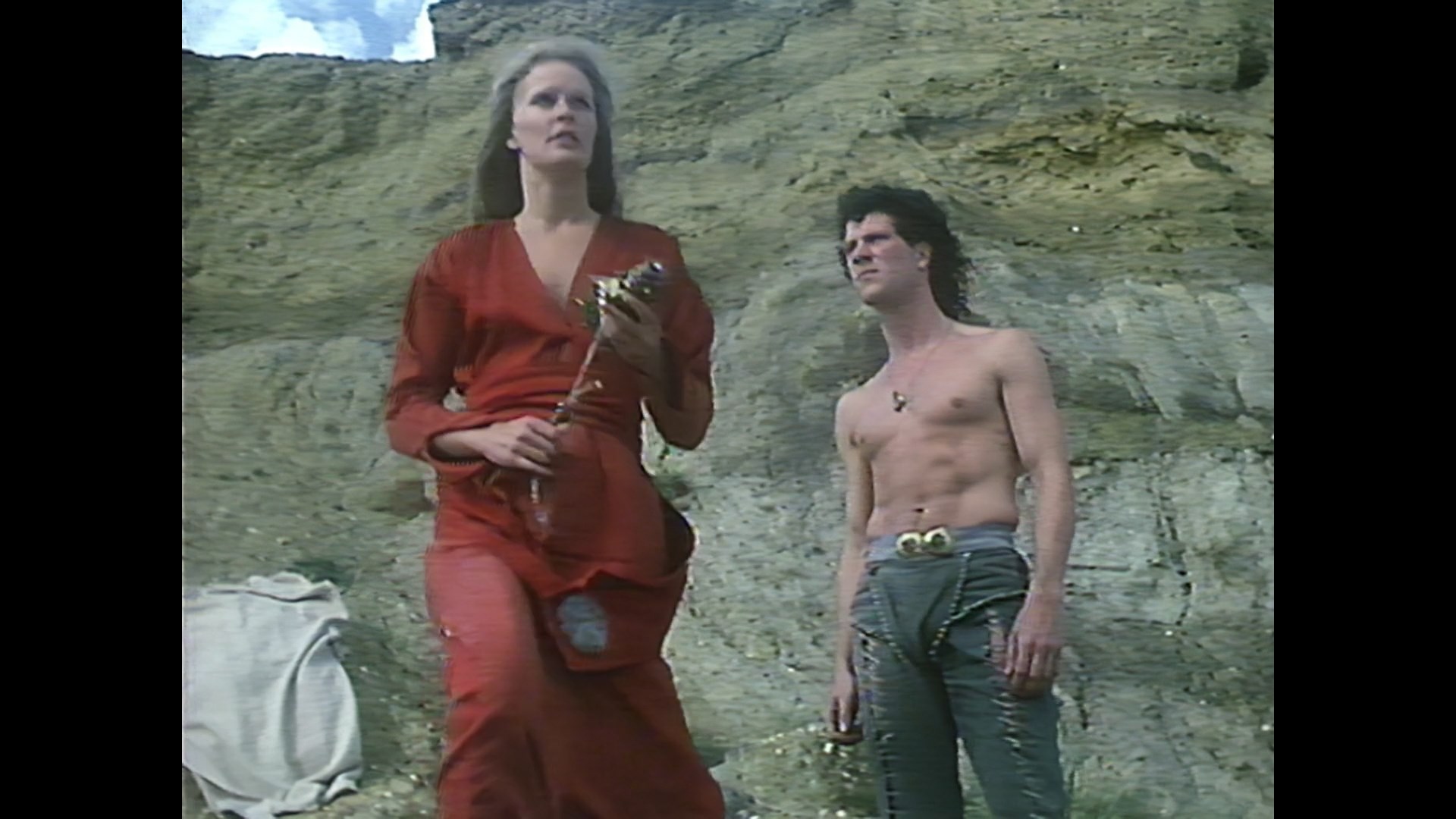 no longer exist on film in any form and had to be pulled from
no longer exist on film in any form and had to be pulled from 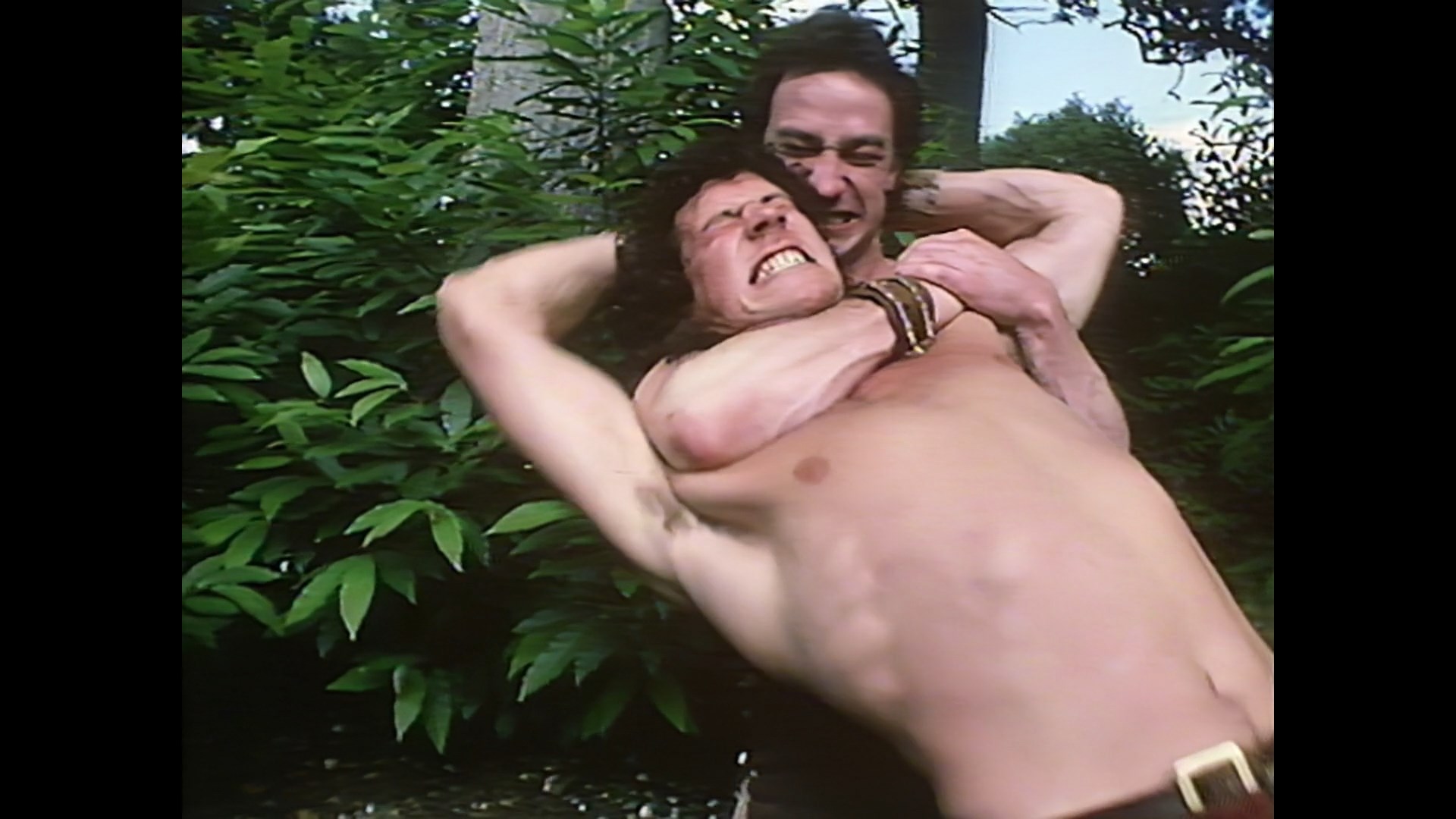 standard def masters. 1986's Tristan, his second and more elaborate take on the Tristan and Iseult legend, is presented in its full-length 108m40s version as well as a revised 87m44s cut entitled Legend of a Hero. It's quite clear this was made in the wake of Excalibur and other sword and sorcery films like Hawk the Slayer, given the more baroque touches like gold body paint, masks, and costumes, not to mention the amount of screen time devoted to buff shirtless guys whacking each other with swords. Several of the usual suspects are on hand here including Rowlands as Iseult and Olliver as Melot, with actor Stephen Harris rocking an incredible permed and gelled hairdo as Tristan.
standard def masters. 1986's Tristan, his second and more elaborate take on the Tristan and Iseult legend, is presented in its full-length 108m40s version as well as a revised 87m44s cut entitled Legend of a Hero. It's quite clear this was made in the wake of Excalibur and other sword and sorcery films like Hawk the Slayer, given the more baroque touches like gold body paint, masks, and costumes, not to mention the amount of screen time devoted to buff shirtless guys whacking each other with swords. Several of the usual suspects are on hand here including Rowlands as Iseult and Olliver as Melot, with actor Stephen Harris rocking an incredible permed and gelled hairdo as Tristan. 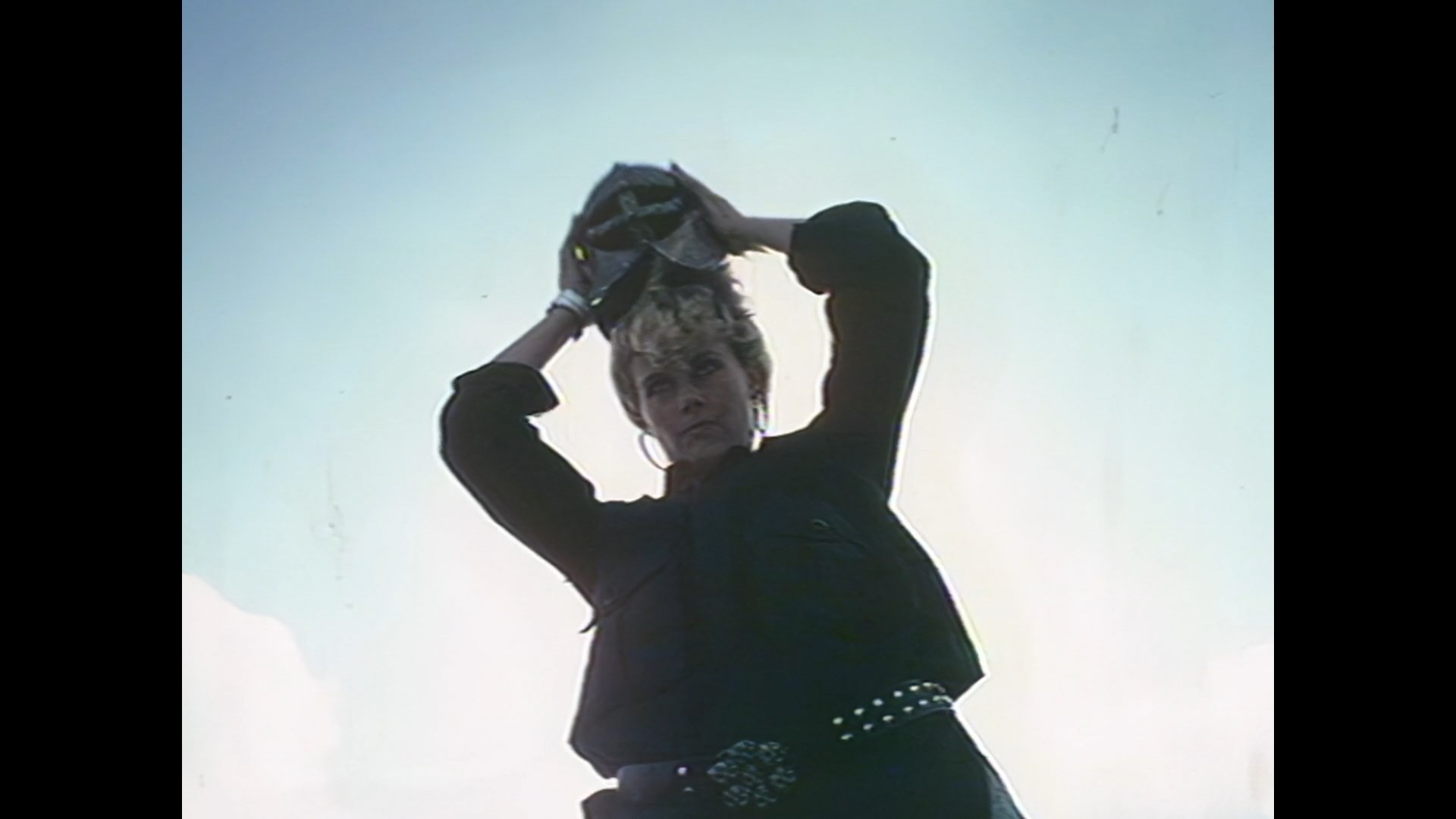 to keep them safe. The duo awaken 25 years later to find the natural
to keep them safe. The duo awaken 25 years later to find the natural 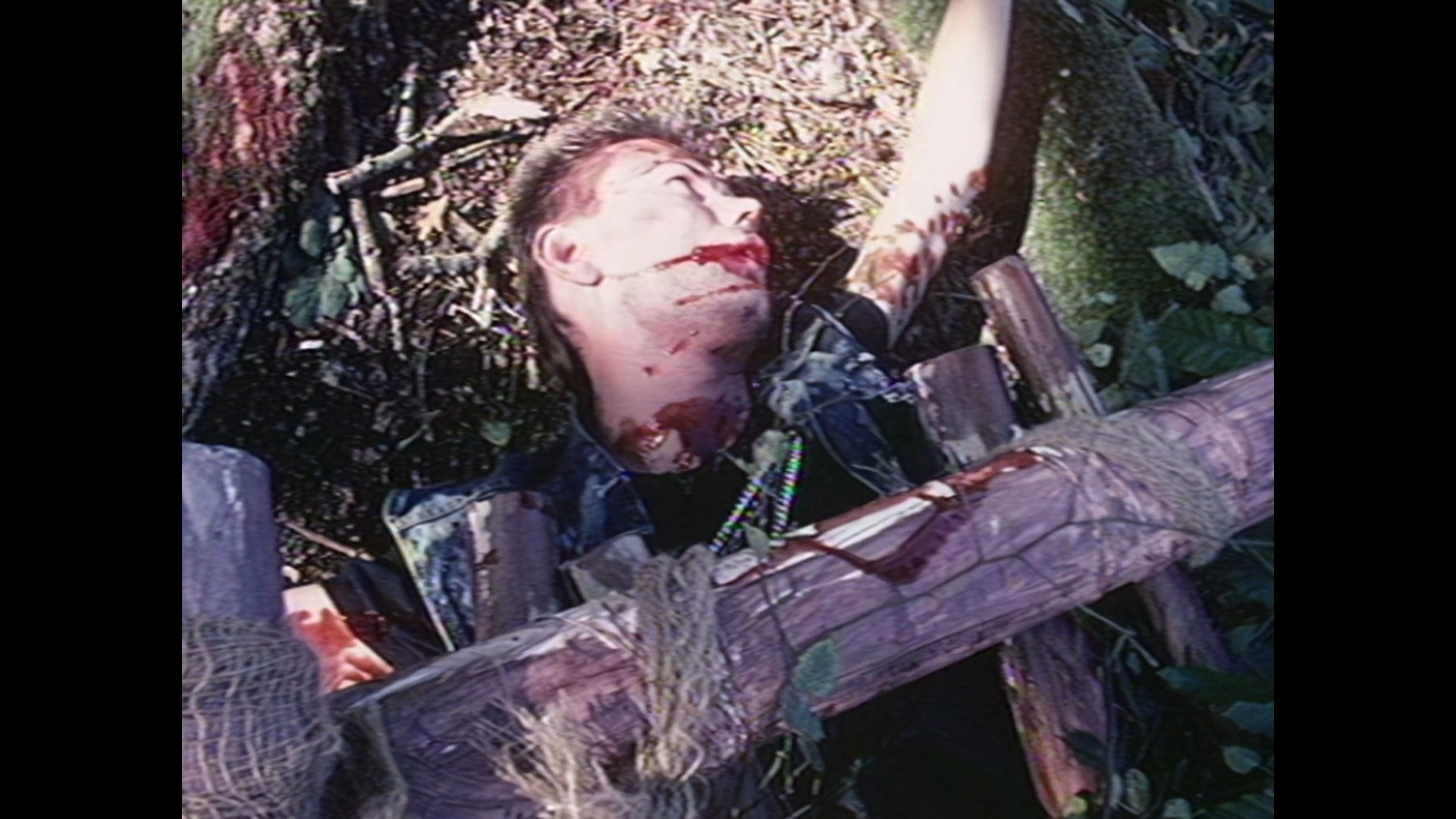 world pretty much back to normal, but when Paul steps away to take a leak, he's accosted by mace-wielding punks who send the couple running off on feet from their motorcycles. Said punks are locked in a territorial feud with some nasty mutants and ruled over by the Messiah (Olliver of course), a fascist freak who forces people to participate in the death run (basically a chase through the woods involving a long wire and lots of blood). Cannibals, carnage, and shirtless combat training ensue on the way to a climax you'll never believe. Hugely entertaining and bonkers from start to finish, this will likely be a lot of newcomers' favorite film in the set even in its compromised existing form; how this was allowed to languish in obscurity instead of being preserved by the BFI is a mystery for the ages. As for extras, "Murlyn's Cave" (21m55s) features Lyndon and other collaborators (Chris Porter, Mark Iain Davidson, Jude Flanagan, and June Bunday) visiting the director's home after his death to save as much of his belongings as they can. In addition to providing an interesting look at the very rough storage conditions for a lot of the material in this set, it's a sobering reminder of how easily independent film productions can be lost entirely. Also included are two Legend of a Hero trailers, two Death Run trailers, a 42-image gallery, and script galleries for both films.
world pretty much back to normal, but when Paul steps away to take a leak, he's accosted by mace-wielding punks who send the couple running off on feet from their motorcycles. Said punks are locked in a territorial feud with some nasty mutants and ruled over by the Messiah (Olliver of course), a fascist freak who forces people to participate in the death run (basically a chase through the woods involving a long wire and lots of blood). Cannibals, carnage, and shirtless combat training ensue on the way to a climax you'll never believe. Hugely entertaining and bonkers from start to finish, this will likely be a lot of newcomers' favorite film in the set even in its compromised existing form; how this was allowed to languish in obscurity instead of being preserved by the BFI is a mystery for the ages. As for extras, "Murlyn's Cave" (21m55s) features Lyndon and other collaborators (Chris Porter, Mark Iain Davidson, Jude Flanagan, and June Bunday) visiting the director's home after his death to save as much of his belongings as they can. In addition to providing an interesting look at the very rough storage conditions for a lot of the material in this set, it's a sobering reminder of how easily independent film productions can be lost entirely. Also included are two Legend of a Hero trailers, two Death Run trailers, a 42-image gallery, and script galleries for both films.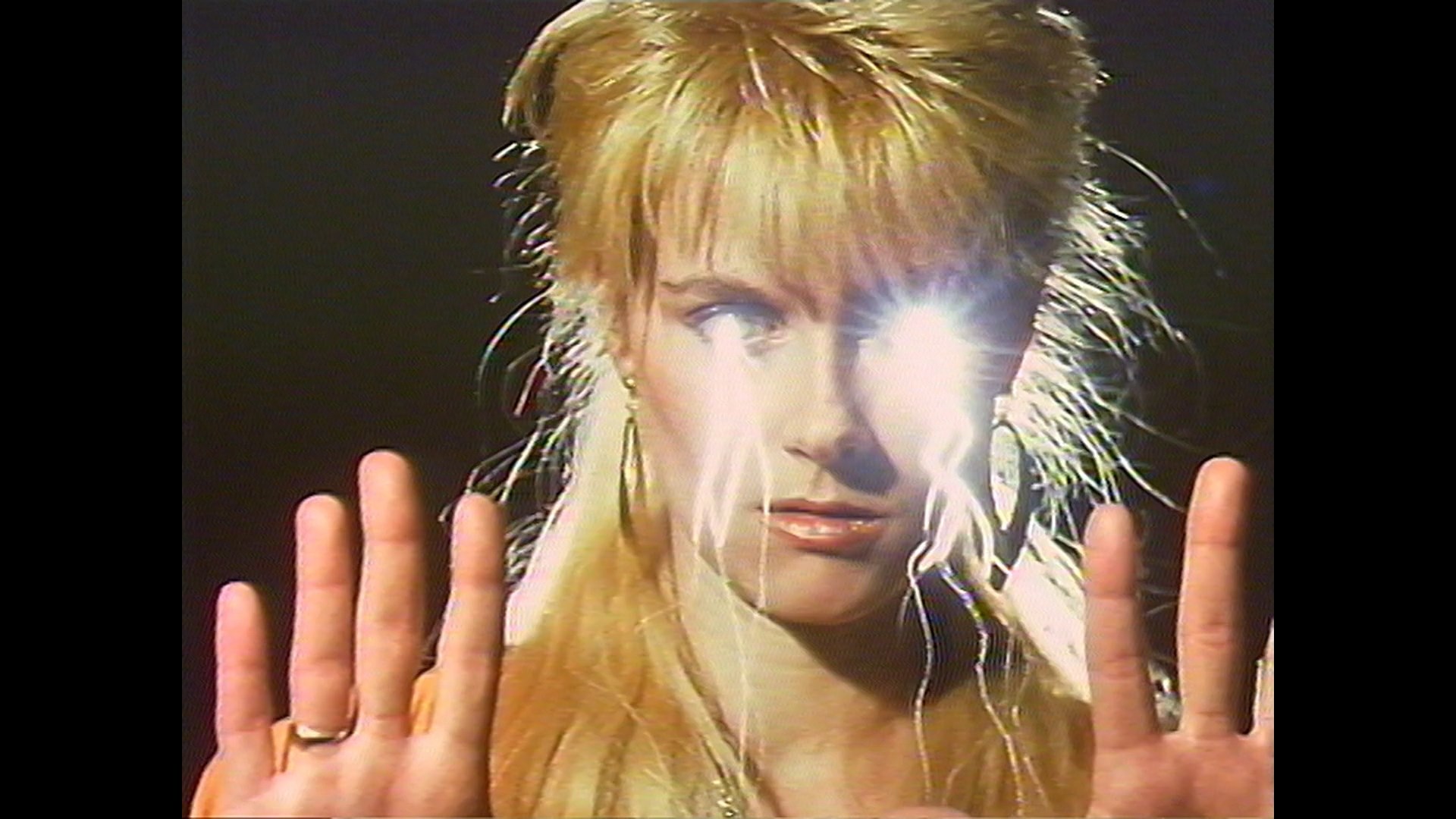 The fantasy continues on
The fantasy continues on 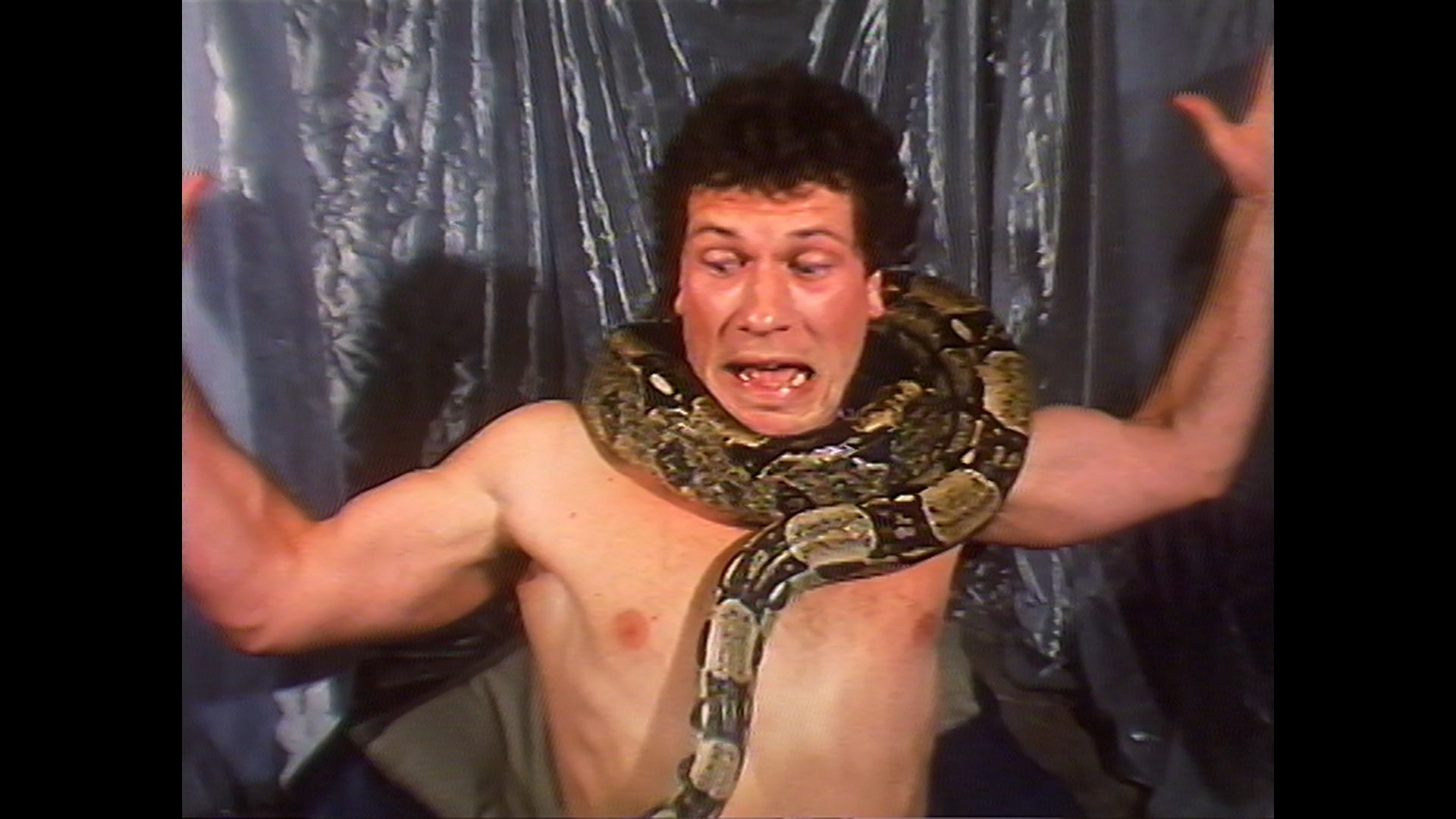 disc five with 1989's Avalon (84m8s), whose film elements also went up in smoke and which is presented here from the best surviving SD source. The Excalibur influence still carries on here, albeit with some insane shiny outfits straight out of a TV variety show, with the Arthurian saga about the evil reign of Morgana (Debbi Stevens) whose sacrifice of the poor Clothilde (Abigail Blackmore) is thwarted by stud-muffin swordsman Owen (Stephen Harris). Accompanied by thief Keiran (Bartlett again) and Merlin (Olliver), they set off for the fabled land of Avalon where they can retrieve a mystical sword capable of vanquishing the tyrannical sorceress and her army of white-robed Druids. Again your tolerance for zero-budget sword and sorcery antics will determine how much you enjoy this one, but it packs a lot of action and goofiness into the running time (not to mention plenty of mullets).
disc five with 1989's Avalon (84m8s), whose film elements also went up in smoke and which is presented here from the best surviving SD source. The Excalibur influence still carries on here, albeit with some insane shiny outfits straight out of a TV variety show, with the Arthurian saga about the evil reign of Morgana (Debbi Stevens) whose sacrifice of the poor Clothilde (Abigail Blackmore) is thwarted by stud-muffin swordsman Owen (Stephen Harris). Accompanied by thief Keiran (Bartlett again) and Merlin (Olliver), they set off for the fabled land of Avalon where they can retrieve a mystical sword capable of vanquishing the tyrannical sorceress and her army of white-robed Druids. Again your tolerance for zero-budget sword and sorcery antics will determine how much you enjoy this one, but it packs a lot of action and goofiness into the running time (not to mention plenty of mullets). 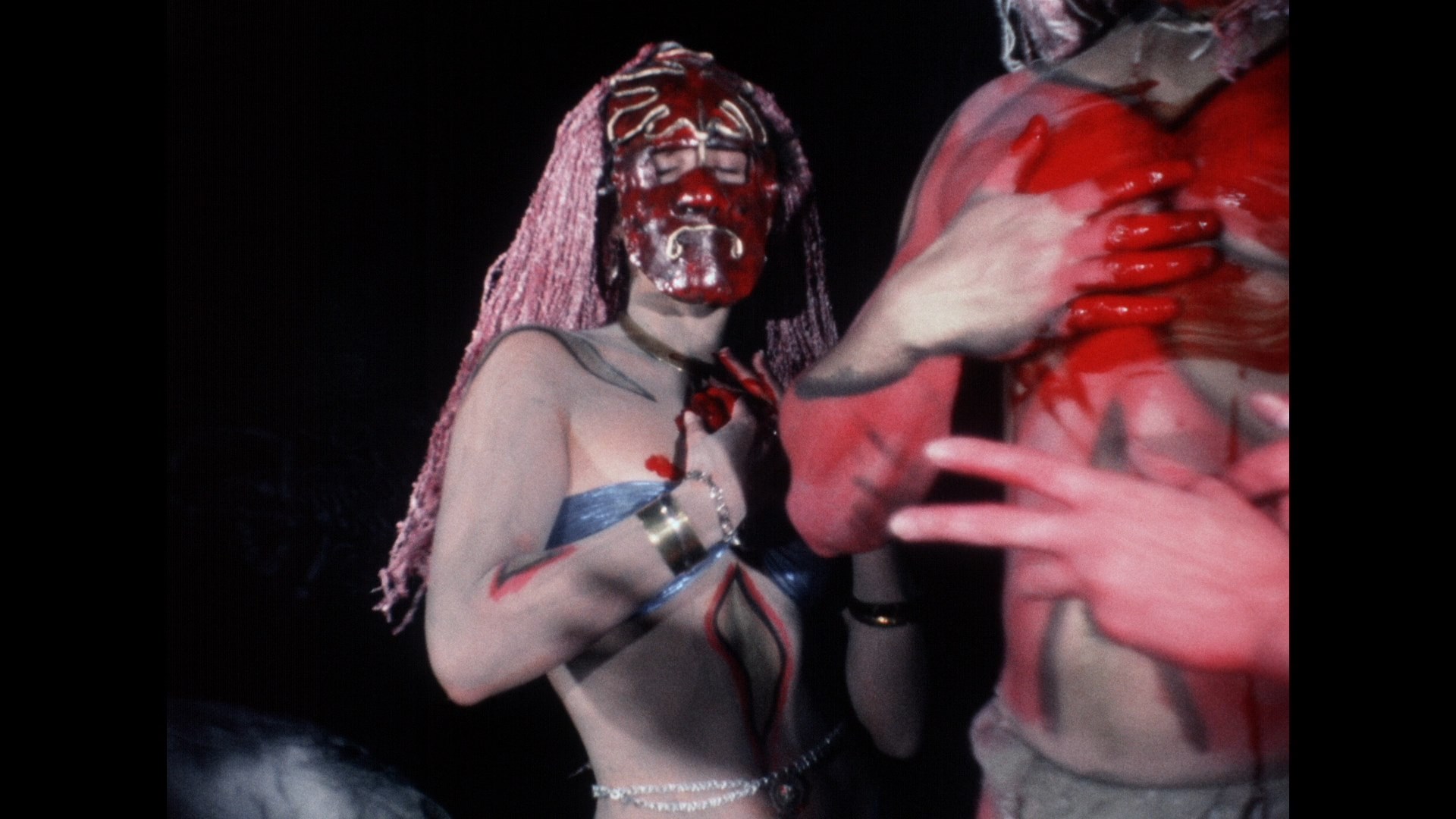 This one starts off crazy right out of the gate
This one starts off crazy right out of the gate 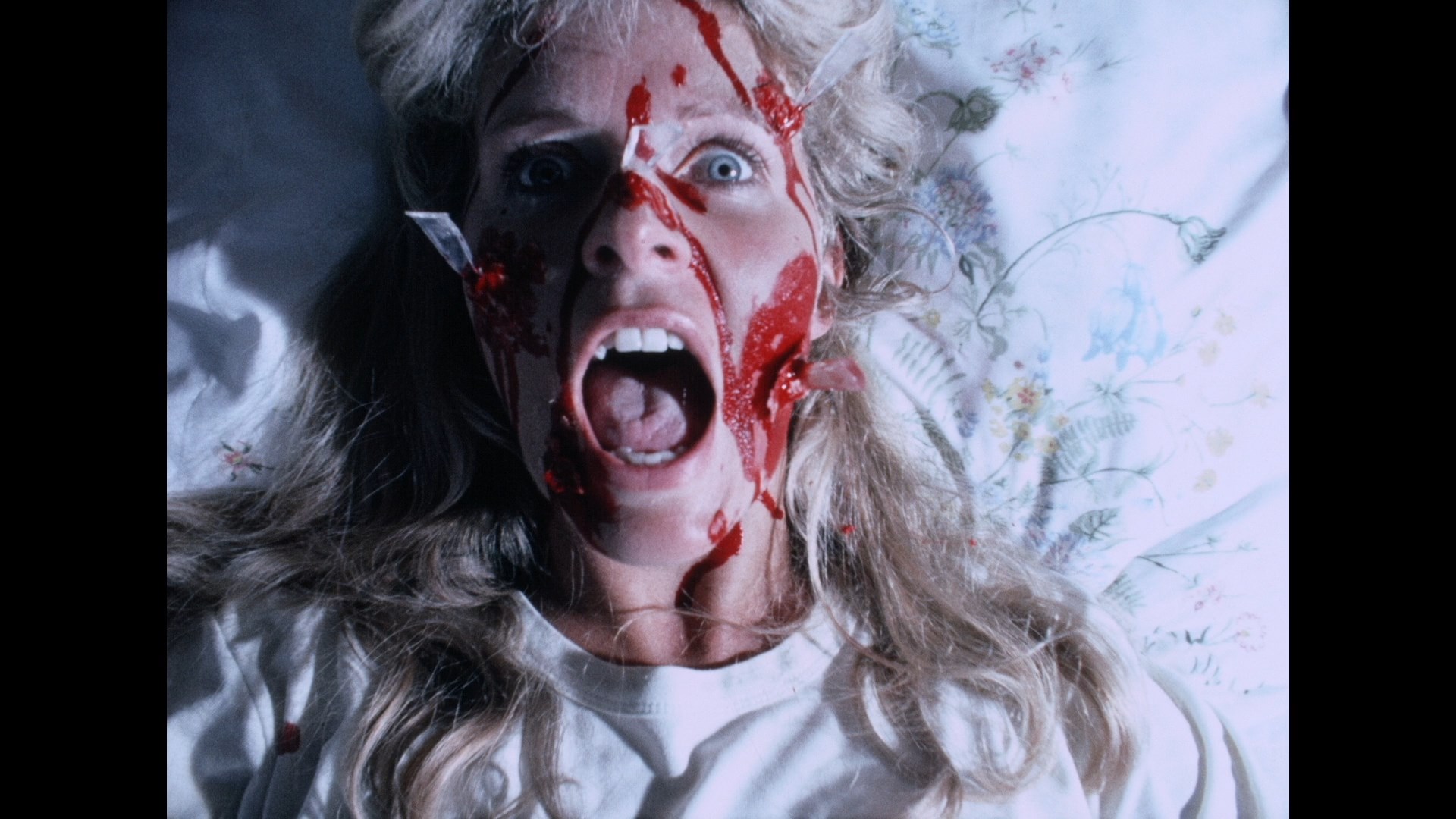 with a nocturnal Satanic sacrificial ceremony performed by a bunch of naked people covered in body paint, which turns out to be a nightmare experienced by Sarah (Judith Holding) on a train through the countryside. She arrives at her new job working as the secretary to novelist Edward Lucan (Olliver), though she spends her downtime reading about the occult and getting to know the locals like parish priest Father Daniel (Lyndon). As it turns out, Lucan is working on a book about the Antichrist (who's tied to Napoleon and Hitler somehow), which must be brought about through the skills of a shaman. There's a strong Hammer House of Horror vibe in this one, which will appeal particularly to fans of the current folk horror craze with its nefarious insidious and ancient practices lurking in a pastoral setting. Of course, this being a Murphy film there's also a truly hilarious tunnel brawl outside a pub, a suspicious pet shop owner boyfriend, and Lyndon shooting green lasers out of his mouth. The main video extra here is "Murphy's Lore Part 2: Method" (20m37s) with the director and Olliver swapping stories about some of their wilder moments including some choice bits with the cars and crazy outfits outdoors on Death Run. Also included are two trailers for Avalon, a Moonchild trailer (reconstructed in HD), a 30-image gallery, and an Avalon script gallery.
with a nocturnal Satanic sacrificial ceremony performed by a bunch of naked people covered in body paint, which turns out to be a nightmare experienced by Sarah (Judith Holding) on a train through the countryside. She arrives at her new job working as the secretary to novelist Edward Lucan (Olliver), though she spends her downtime reading about the occult and getting to know the locals like parish priest Father Daniel (Lyndon). As it turns out, Lucan is working on a book about the Antichrist (who's tied to Napoleon and Hitler somehow), which must be brought about through the skills of a shaman. There's a strong Hammer House of Horror vibe in this one, which will appeal particularly to fans of the current folk horror craze with its nefarious insidious and ancient practices lurking in a pastoral setting. Of course, this being a Murphy film there's also a truly hilarious tunnel brawl outside a pub, a suspicious pet shop owner boyfriend, and Lyndon shooting green lasers out of his mouth. The main video extra here is "Murphy's Lore Part 2: Method" (20m37s) with the director and Olliver swapping stories about some of their wilder moments including some choice bits with the cars and crazy outfits outdoors on Death Run. Also included are two trailers for Avalon, a Moonchild trailer (reconstructed in HD), a 30-image gallery, and an Avalon script gallery.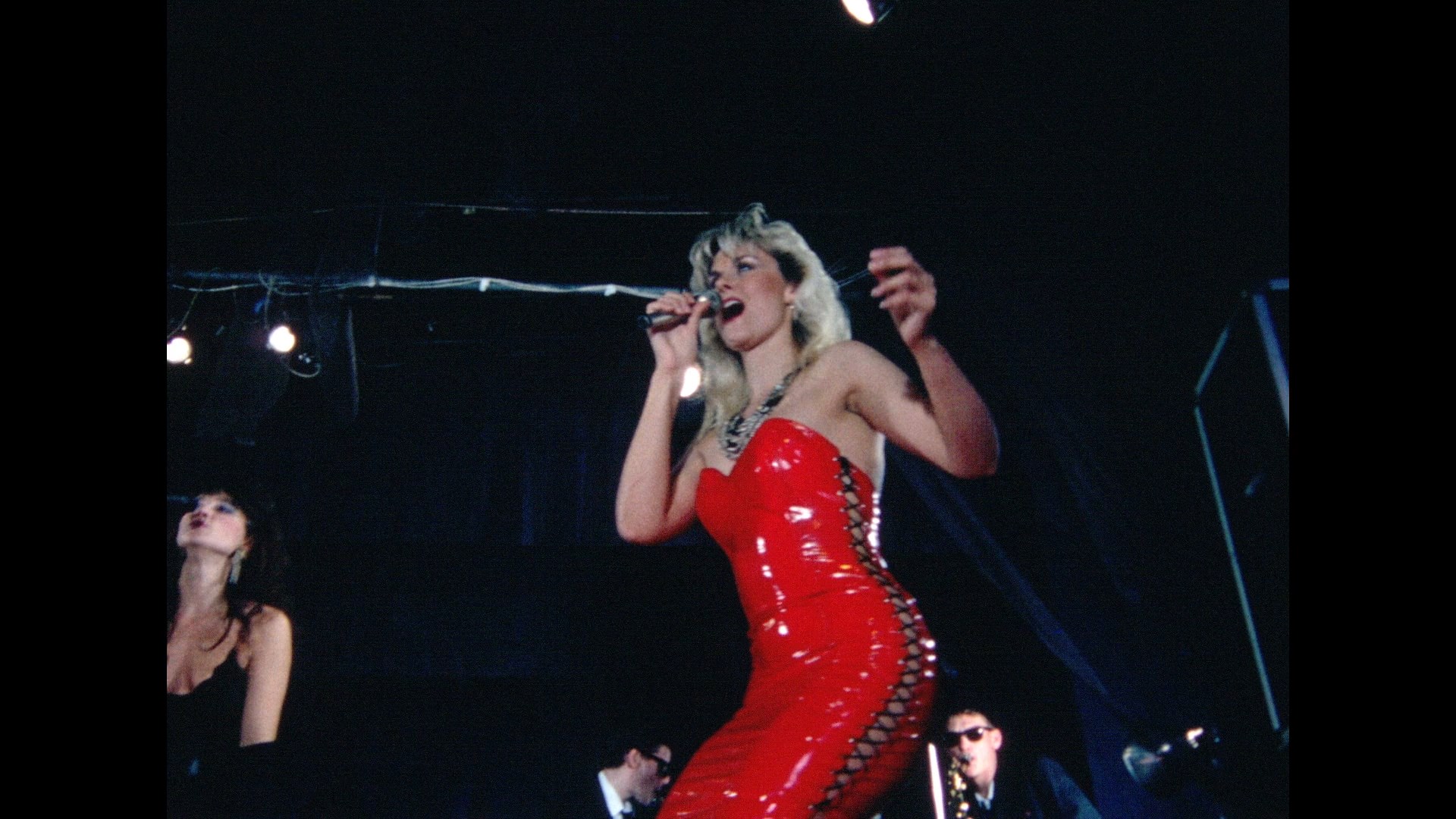 disc six you'll find one of the Murphy's most widely available films on the gray
disc six you'll find one of the Murphy's most widely available films on the gray 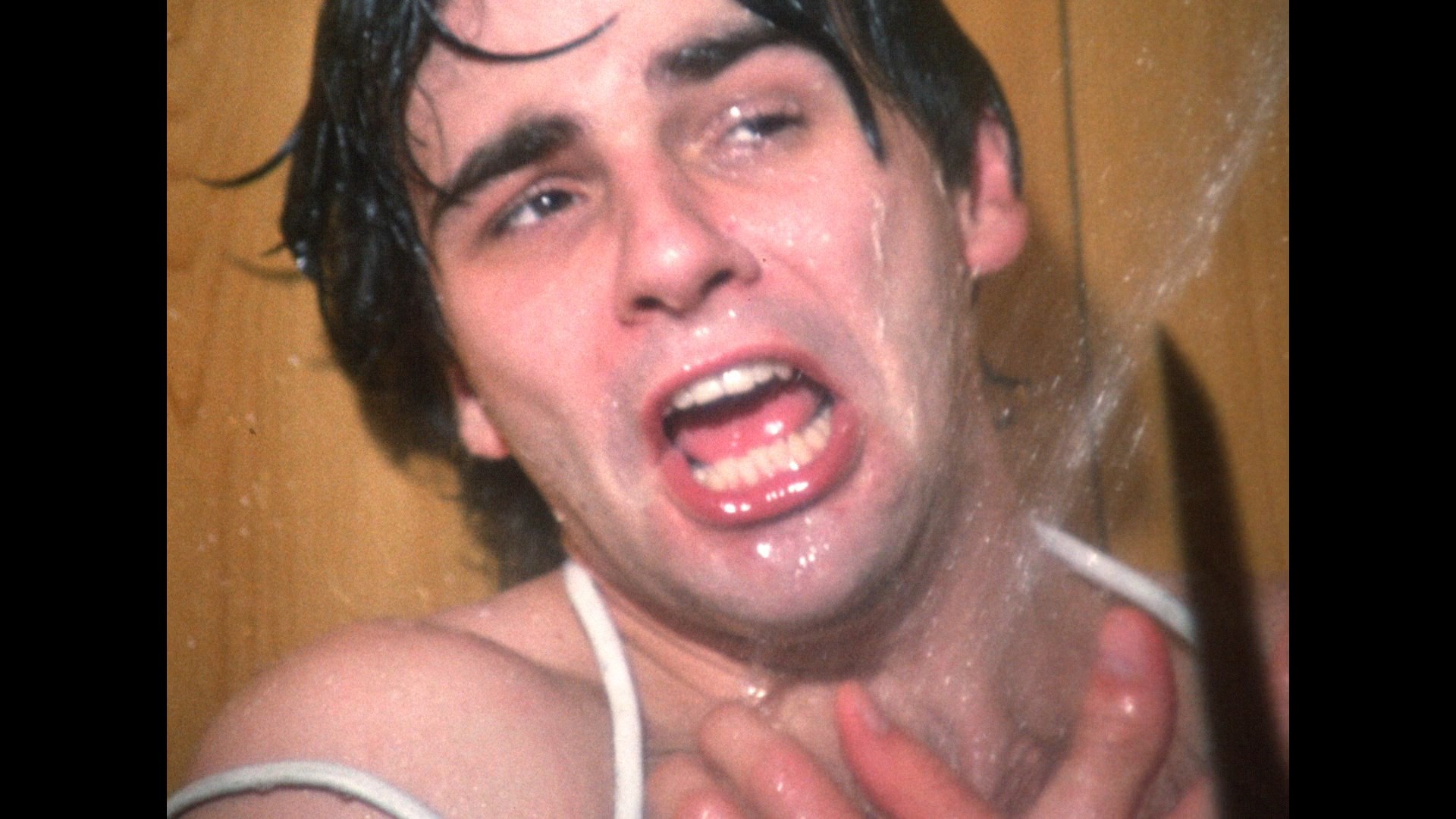 market for some reason, 1990's Torment (90m23s), initially sourced from a scarce Polish VHS release or a British TV airing. The original 16mm materials for this one have also survived, and it looks gorgeous here with a very crisp 2K restoration. Stevens returns here as Anna Bell, a singer and scandal sheet fixture who decides the constant limelight is wearing her down. She decides to take some time off in the country (much to the annoyance of her manager played by Lyndon), where she can write some new songs and recharge her batteries. The arrival of handyman Mathew (Bartlett) seems like a welcome development, but that's complicated by a nearby strangler murder and the intrusion of catty choreographer Guy (Olliver in an Estelle Parsons wig) and Anna's estranged sister, Fiona (Rowlands). Soon it turns out someone has some very sinister designs on Anna, whose own mental instability might be nearing the tipping point. An entertaining mixture of stalk-and-slash and psychodrama, this one veers into a fascinating final third that upends the standard victim portrayal in horror movies; to say more would ruin things, but both Stevens and Barlett give pretty fearless performances here. The poetic ending is very nicely as well, and it's wild seeing Olliver going even more over the top than Death Run here.
market for some reason, 1990's Torment (90m23s), initially sourced from a scarce Polish VHS release or a British TV airing. The original 16mm materials for this one have also survived, and it looks gorgeous here with a very crisp 2K restoration. Stevens returns here as Anna Bell, a singer and scandal sheet fixture who decides the constant limelight is wearing her down. She decides to take some time off in the country (much to the annoyance of her manager played by Lyndon), where she can write some new songs and recharge her batteries. The arrival of handyman Mathew (Bartlett) seems like a welcome development, but that's complicated by a nearby strangler murder and the intrusion of catty choreographer Guy (Olliver in an Estelle Parsons wig) and Anna's estranged sister, Fiona (Rowlands). Soon it turns out someone has some very sinister designs on Anna, whose own mental instability might be nearing the tipping point. An entertaining mixture of stalk-and-slash and psychodrama, this one veers into a fascinating final third that upends the standard victim portrayal in horror movies; to say more would ruin things, but both Stevens and Barlett give pretty fearless performances here. The poetic ending is very nicely as well, and it's wild seeing Olliver going even more over the top than Death Run here. 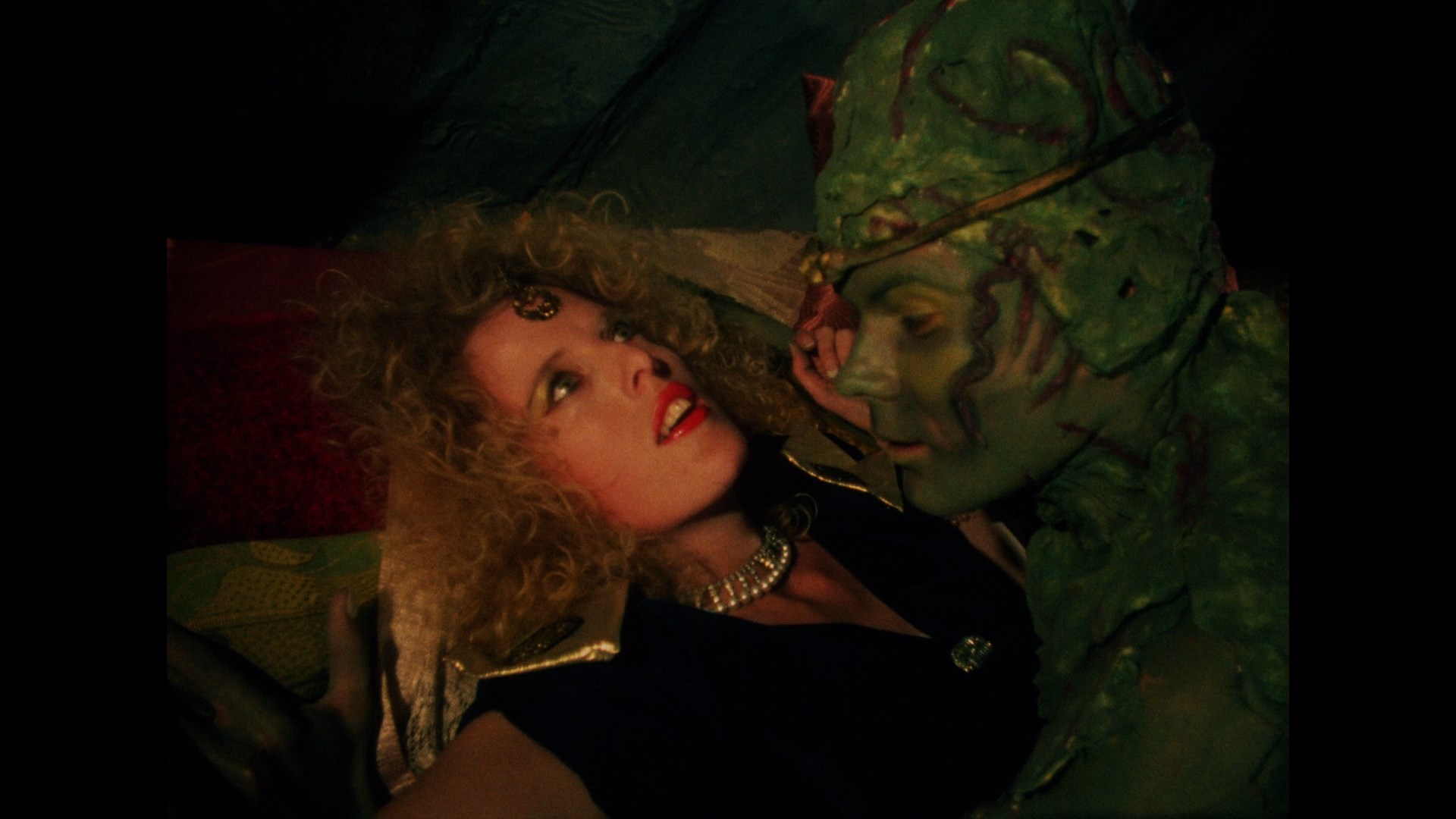 kingdom, everyone seems to swordfight all day while Sartor (a bald-headed Olliver) stares at a glowing red crystal. Meanwhile the green-sinned, red-veined Master (Lyndon) arranges for the kidnappings of various poor "scum" above and scarfs down
kingdom, everyone seems to swordfight all day while Sartor (a bald-headed Olliver) stares at a glowing red crystal. Meanwhile the green-sinned, red-veined Master (Lyndon) arranges for the kidnappings of various poor "scum" above and scarfs down 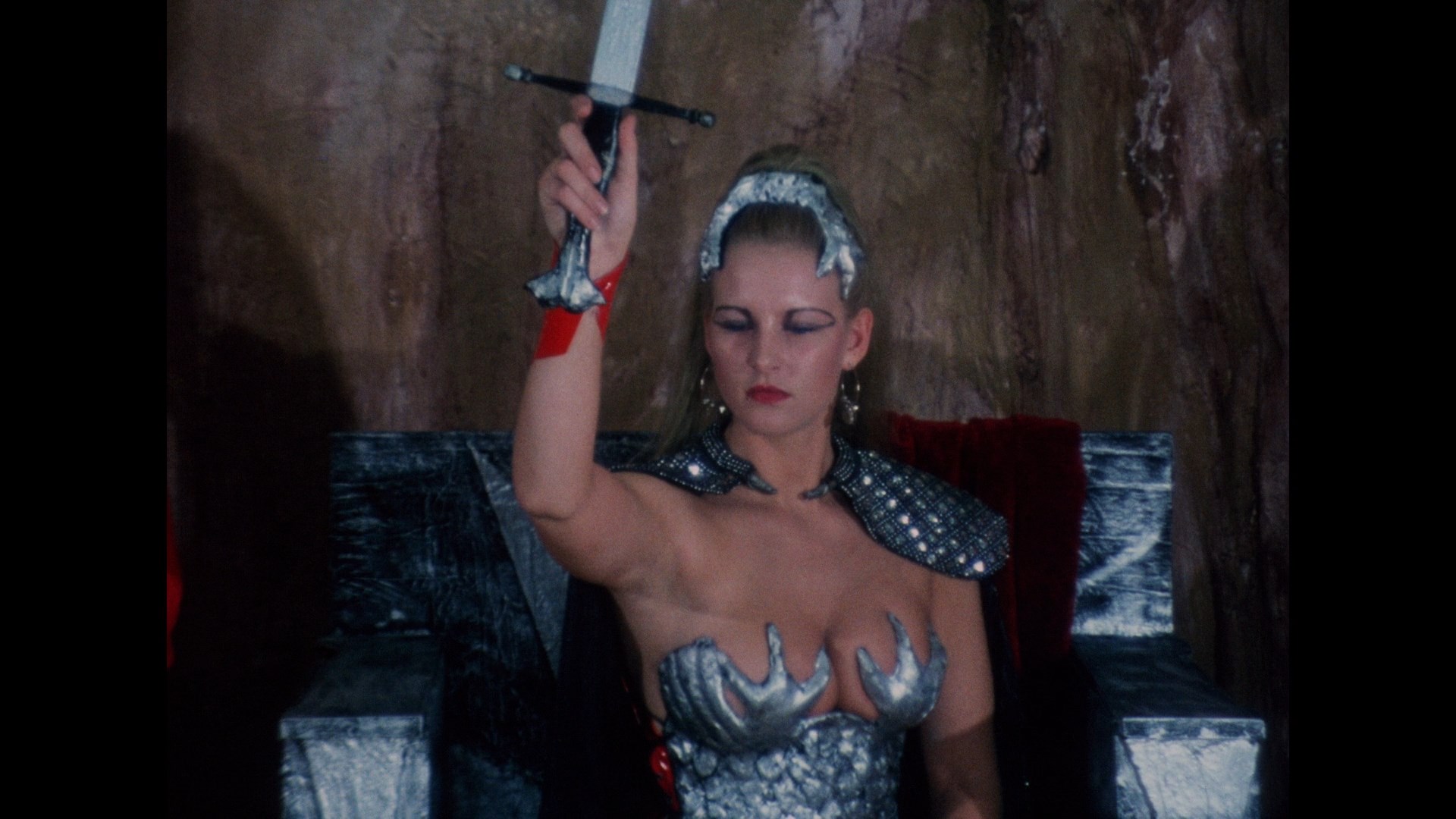 bloody red meat, but the most recent abudctees to harness the power of said crystal, strong-willed Crion (Neil Goulbourn) and his children, might be a step too far. Largely confined to a cavernous set and packed with kitschy costumes, this one is baffling and yet strangely hypnotic at the same time with its droning new age music somehow enhancing all the weird production design choices like a gigantic ball of metallic twine. Toss in some magic swords, teased hair, and the return of Stevens as the all-important "Crystal Child," and you've got another slice of Murphy madness at full throttle. The original 16mm elements for this one have also survived, yielding an insanely colorful 2K restoration that could do serious eyeball damage on a big screen. This one also comes with a 2010 audio commentary by Murphy, Lyndon, Judith Holding, and June Bunday, which unfortunately has the movie audio running a bit loudly along with them but is still worth a listen as they look back at the process of casting, creating the props, practicing battle scenes, and making the most of the special effects at their disposal. Also included are two making-of featurettes for Atlantis circa 2000 and 2009 (7m10s and 6m52s) narrated by Murphy including glimpses of a Super 8 version he made in his teens, alternate (and really ugly) Atlantis credit sequences intended for DVD, a 5m21s blooper reel (from Death Run, Moonchild, Torment, Atlantis, and Second Sight), a Torment trailer, two Atlantis trailers, a 45-image gallery, and an Atlantis script gallery.
bloody red meat, but the most recent abudctees to harness the power of said crystal, strong-willed Crion (Neil Goulbourn) and his children, might be a step too far. Largely confined to a cavernous set and packed with kitschy costumes, this one is baffling and yet strangely hypnotic at the same time with its droning new age music somehow enhancing all the weird production design choices like a gigantic ball of metallic twine. Toss in some magic swords, teased hair, and the return of Stevens as the all-important "Crystal Child," and you've got another slice of Murphy madness at full throttle. The original 16mm elements for this one have also survived, yielding an insanely colorful 2K restoration that could do serious eyeball damage on a big screen. This one also comes with a 2010 audio commentary by Murphy, Lyndon, Judith Holding, and June Bunday, which unfortunately has the movie audio running a bit loudly along with them but is still worth a listen as they look back at the process of casting, creating the props, practicing battle scenes, and making the most of the special effects at their disposal. Also included are two making-of featurettes for Atlantis circa 2000 and 2009 (7m10s and 6m52s) narrated by Murphy including glimpses of a Super 8 version he made in his teens, alternate (and really ugly) Atlantis credit sequences intended for DVD, a 5m21s blooper reel (from Death Run, Moonchild, Torment, Atlantis, and Second Sight), a Torment trailer, two Atlantis trailers, a 45-image gallery, and an Atlantis script gallery. 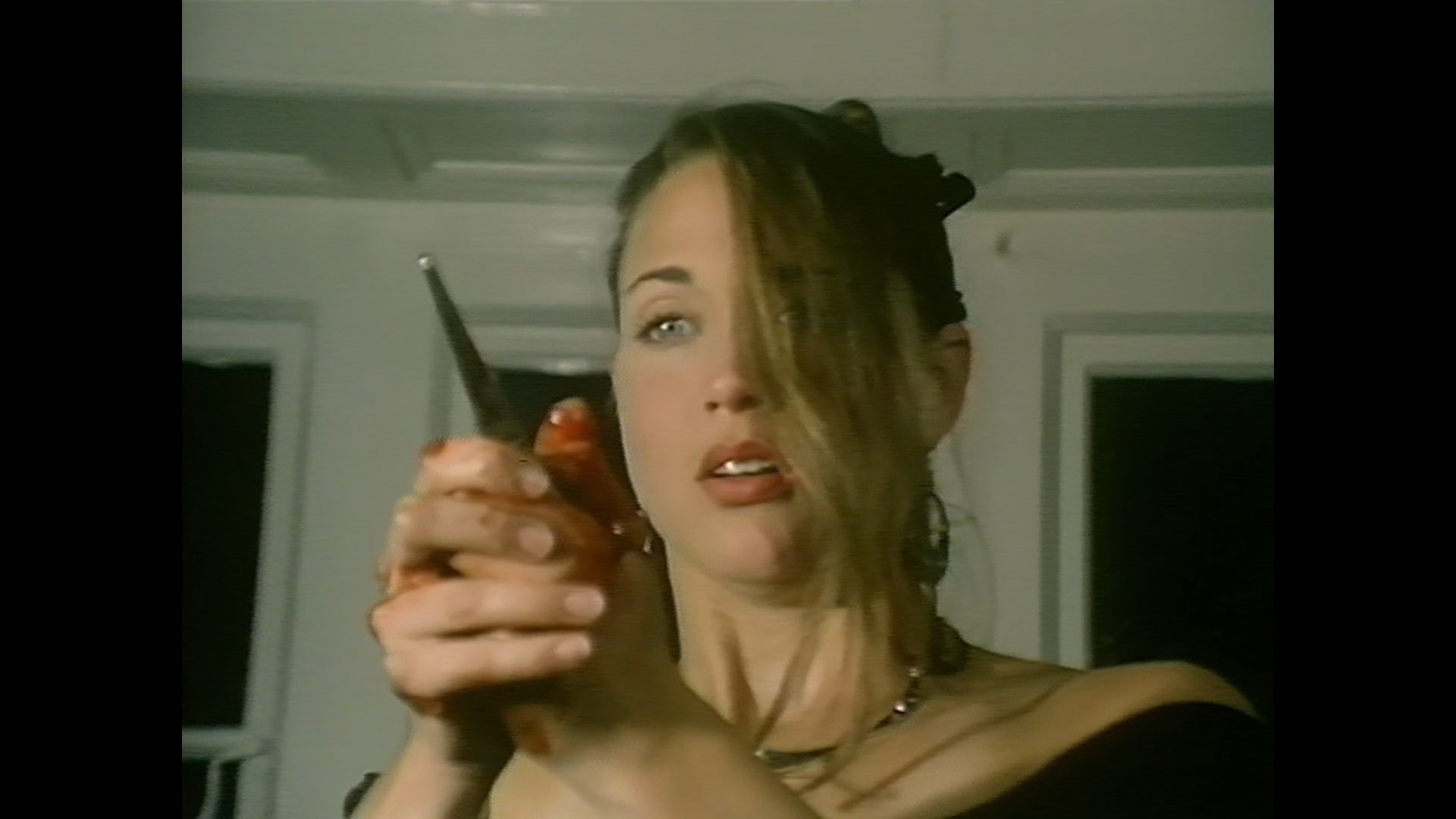 more familiar thriller territory, more or less, on disc seven with
more familiar thriller territory, more or less, on disc seven with 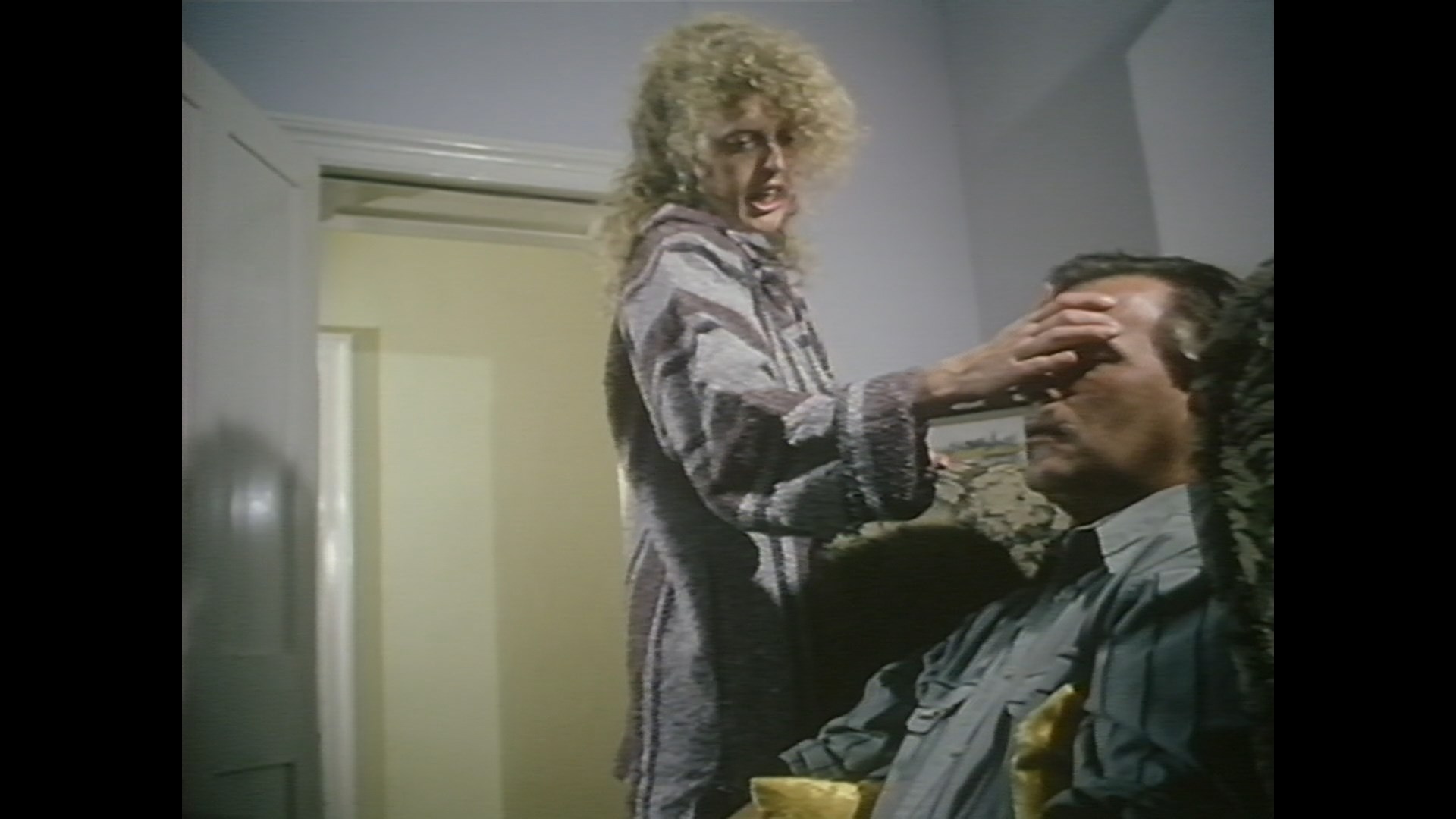 1991's Second Sight (89m58s), preserved here from the director's SD tape master since the film elements are unavailable. Olliver takes center stage here as Ray, a novelist relocated to the quiet countryside to work on his latest suspense book. His younger new wife, Vicki (Amy Raasch), has trouble adjusting to the setting compared to the city, while Ray seems to put a lot of stock in a local psychic, Tanith (Judith Holding). Things take a nasty twist when a man from Vicki's past shows up, leading to an untimely death and the involvement of Ray's current protege, Nick (James Reynard). Deceptions, spontaneous blindness, and adultery all become part of a game that proves to be even stranger than Ray's fiction. Featuring a very tiny cast and definitely in the spirit of Murphy's earlier suspense films, this one ticks off the usual boxes including a flurry of plot twists at the end and an ironic final flourish.
1991's Second Sight (89m58s), preserved here from the director's SD tape master since the film elements are unavailable. Olliver takes center stage here as Ray, a novelist relocated to the quiet countryside to work on his latest suspense book. His younger new wife, Vicki (Amy Raasch), has trouble adjusting to the setting compared to the city, while Ray seems to put a lot of stock in a local psychic, Tanith (Judith Holding). Things take a nasty twist when a man from Vicki's past shows up, leading to an untimely death and the involvement of Ray's current protege, Nick (James Reynard). Deceptions, spontaneous blindness, and adultery all become part of a game that proves to be even stranger than Ray's fiction. Featuring a very tiny cast and definitely in the spirit of Murphy's earlier suspense films, this one ticks off the usual boxes including a flurry of plot twists at the end and an ironic final flourish. 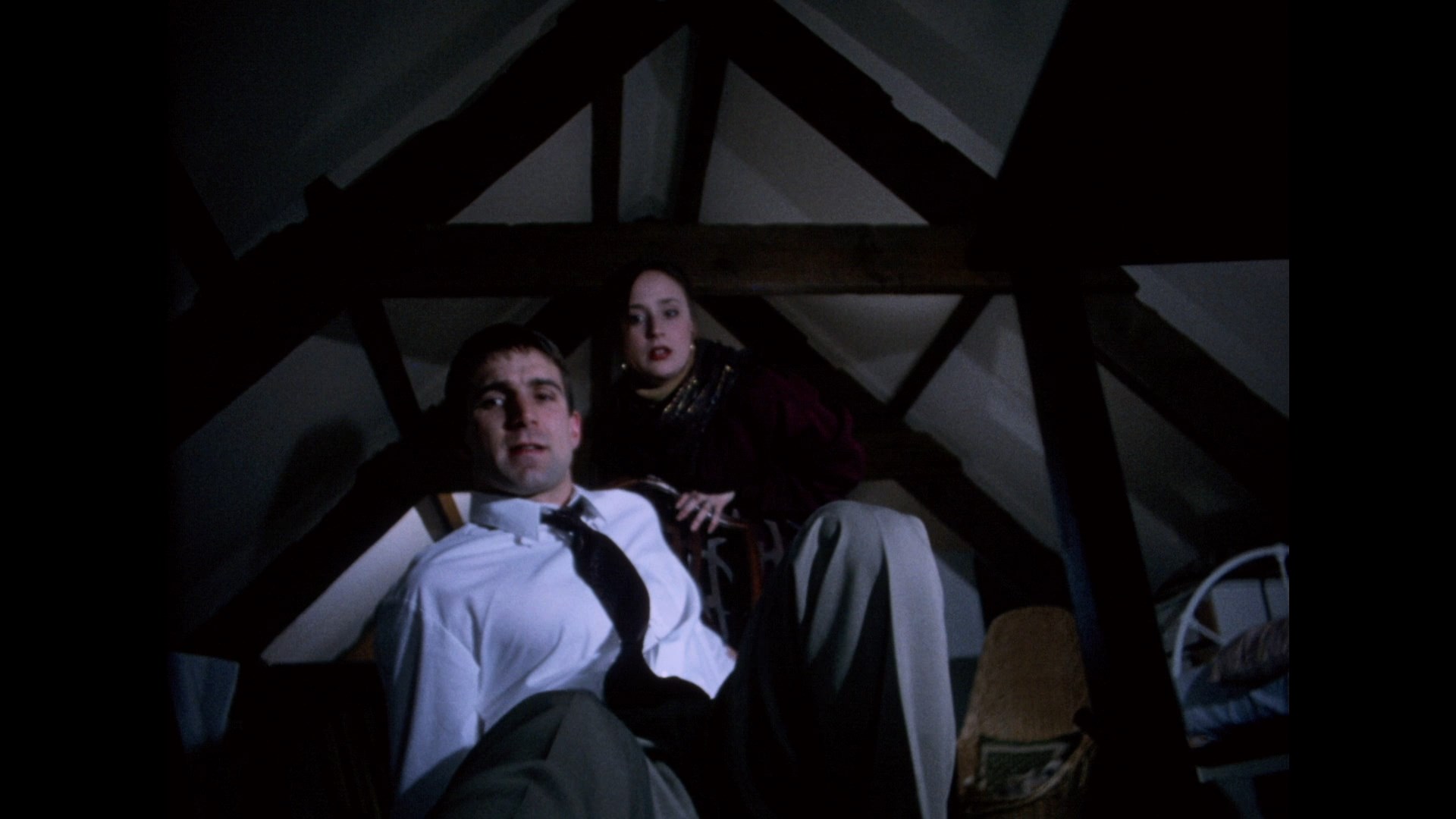 suppress his usual quirks here with a competent if somewhat
suppress his usual quirks here with a competent if somewhat 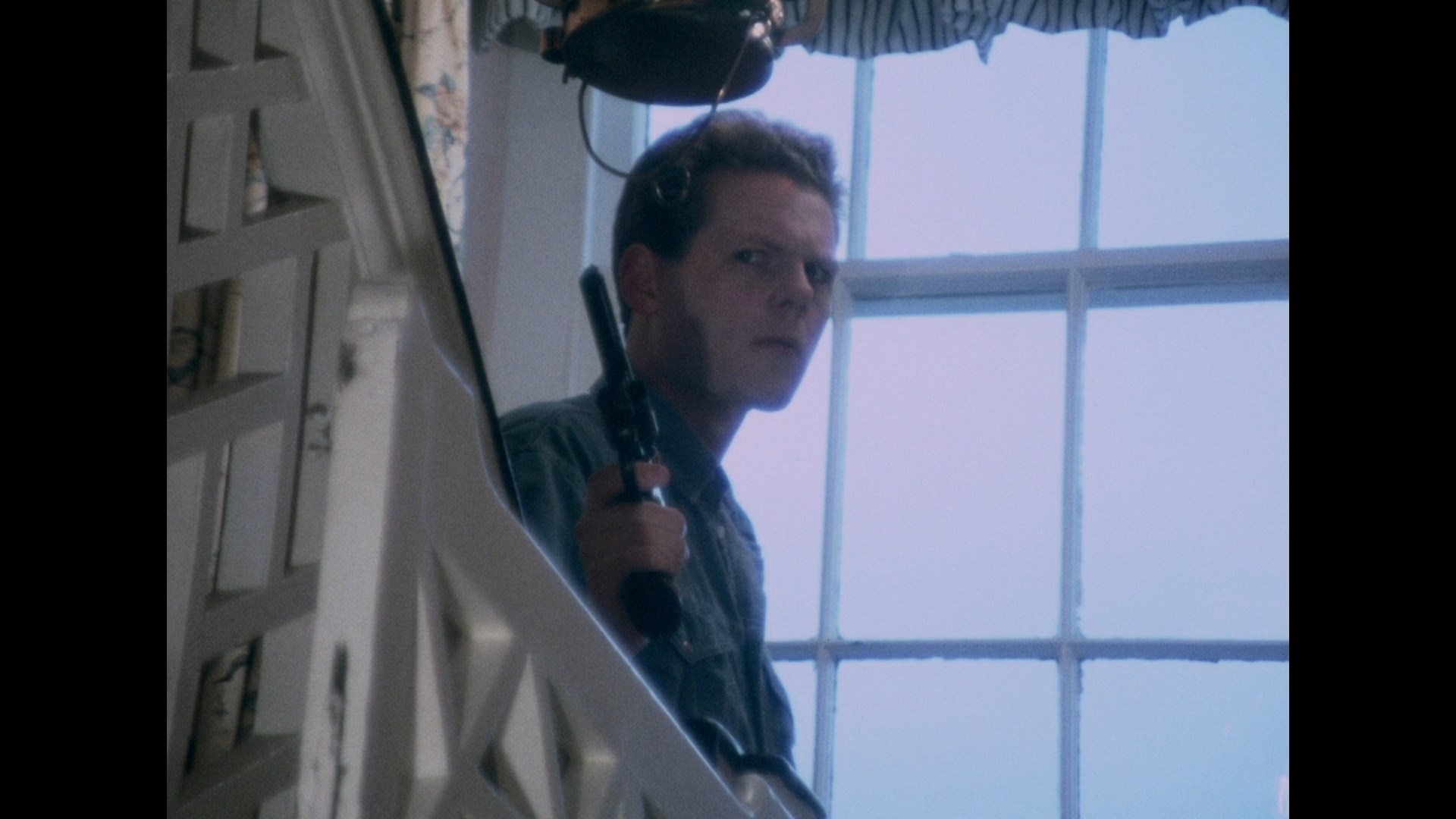 anonymous thriller about the deeply dysfunctional convict Peter Reece (Reynard again) who escapes from jail to run off with his sister, Elise (Kate Steavenson-Payne), about whom he is extremely possessive (to say the least). They take off in the direction of a fishing village but end up being waylaid by roadblocks to stay at a house occupied by an American couple whom they take hostage. Meanwhile local boy Danny (Luke Massy) shows a romantic interest in Elise that turns into an attempt for her to truly see the nature of her brother's dangerous ways. More polished than usual with a higher caliber cast (including TV veteran Timur Kocak, quite good as the hostage husband), this is certainly a painless way to kill 90 minutes and proves Murphy could have moved into the more commercial cable TV or video market if he'd set his mind to it. The main extra for this disc is "Mike Gives Us a Tour of His Home and Studio" (11m16s), which is exactly what it sounds like collecting some outtakes from "Murphy's Lore" and spotlighting some ephemera from his films at his house. Also included are alternate home video credits and the trailer for Road to Nowhere, plus a 35-image gallery.
anonymous thriller about the deeply dysfunctional convict Peter Reece (Reynard again) who escapes from jail to run off with his sister, Elise (Kate Steavenson-Payne), about whom he is extremely possessive (to say the least). They take off in the direction of a fishing village but end up being waylaid by roadblocks to stay at a house occupied by an American couple whom they take hostage. Meanwhile local boy Danny (Luke Massy) shows a romantic interest in Elise that turns into an attempt for her to truly see the nature of her brother's dangerous ways. More polished than usual with a higher caliber cast (including TV veteran Timur Kocak, quite good as the hostage husband), this is certainly a painless way to kill 90 minutes and proves Murphy could have moved into the more commercial cable TV or video market if he'd set his mind to it. The main extra for this disc is "Mike Gives Us a Tour of His Home and Studio" (11m16s), which is exactly what it sounds like collecting some outtakes from "Murphy's Lore" and spotlighting some ephemera from his films at his house. Also included are alternate home video credits and the trailer for Road to Nowhere, plus a 35-image gallery.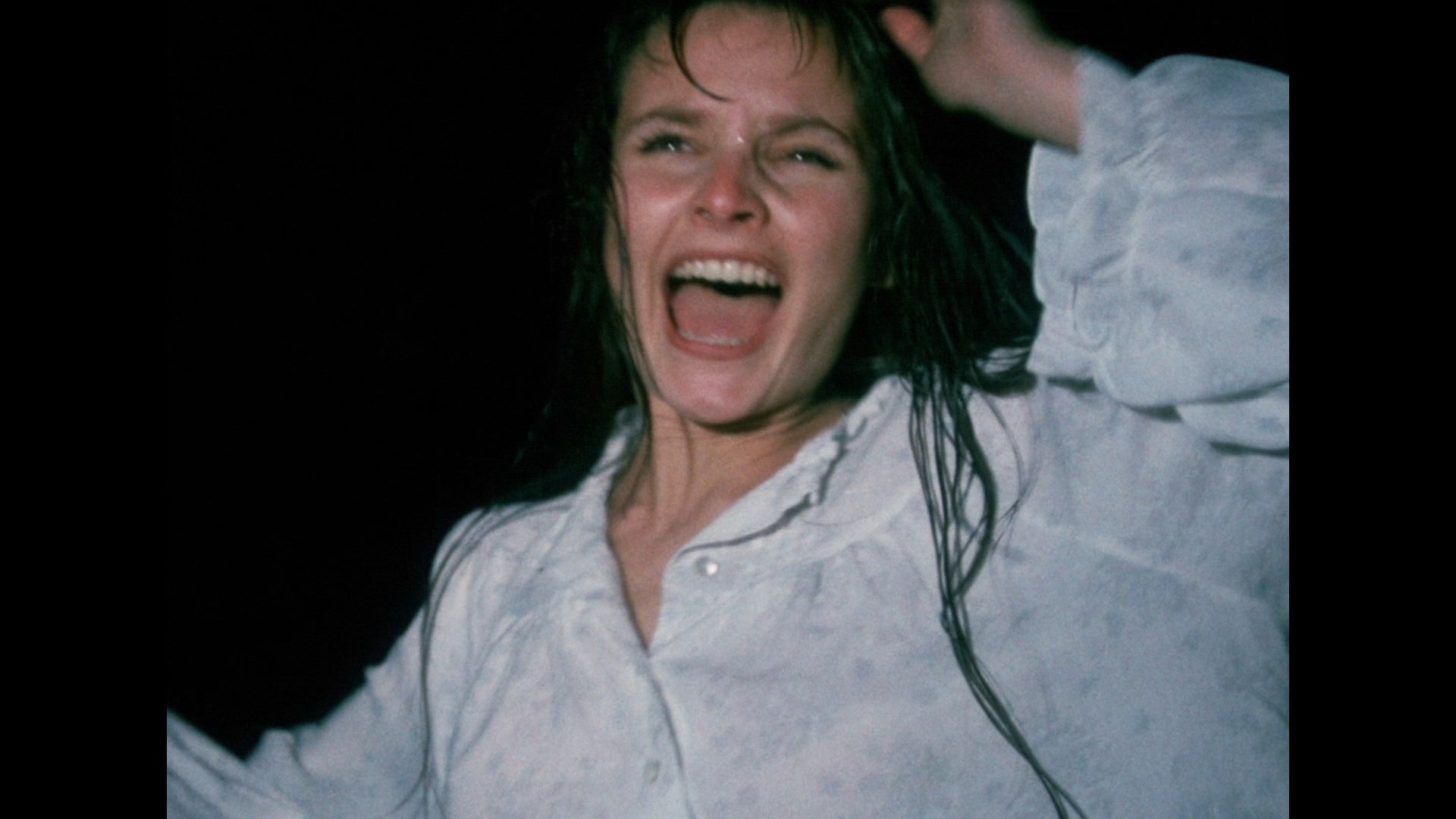 After sitting out horror for a few years, Murphy came
After sitting out horror for a few years, Murphy came 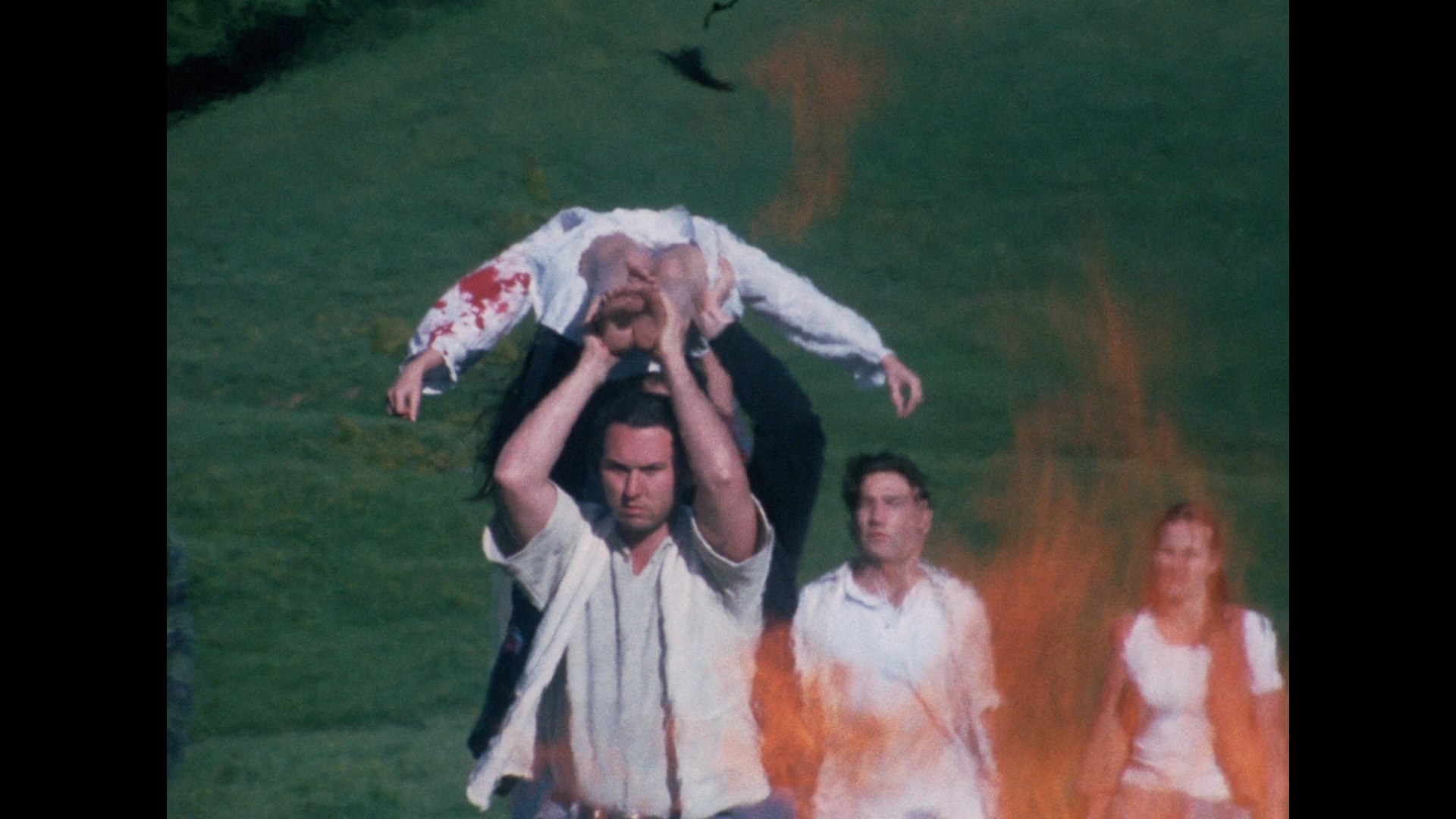 roaring back with a strong outing on disc eight: 1995's The Rite of Spring presented in an immaculate 2K restoration of its original version (90m22s) or a far more widely available video-sourced reedit (81m18s) that's interesting to see (primarily for its alternate music soundtrack) but vastly inferior by comparison. After a curious prologue involving a giggling possessed young woman, Emily (Steavenson-Payne), Reynard is back again, this time as Father James Doyle who's summoned to a country parish where paganism seems to be running as rampant as The Wicker Man or Eye of the Devil. When he isn't trying to save Emily, the priest is sent to the estate of Chris Cavenham (Kocak), the last in the wealthiest family line in the vicinity, only to get tangled up in local practices involving kidnapping, witchcraft, nightmare sequences, and sacrifice. Though it's a bit pokey in the first half (and has nothing to do with the Stravinsky composition of the same name), this is a strange and atmospheric slice of folk horror that doesn't go the direction you might expect during the big reveal at the end.
roaring back with a strong outing on disc eight: 1995's The Rite of Spring presented in an immaculate 2K restoration of its original version (90m22s) or a far more widely available video-sourced reedit (81m18s) that's interesting to see (primarily for its alternate music soundtrack) but vastly inferior by comparison. After a curious prologue involving a giggling possessed young woman, Emily (Steavenson-Payne), Reynard is back again, this time as Father James Doyle who's summoned to a country parish where paganism seems to be running as rampant as The Wicker Man or Eye of the Devil. When he isn't trying to save Emily, the priest is sent to the estate of Chris Cavenham (Kocak), the last in the wealthiest family line in the vicinity, only to get tangled up in local practices involving kidnapping, witchcraft, nightmare sequences, and sacrifice. Though it's a bit pokey in the first half (and has nothing to do with the Stravinsky composition of the same name), this is a strange and atmospheric slice of folk horror that doesn't go the direction you might expect during the big reveal at the end. 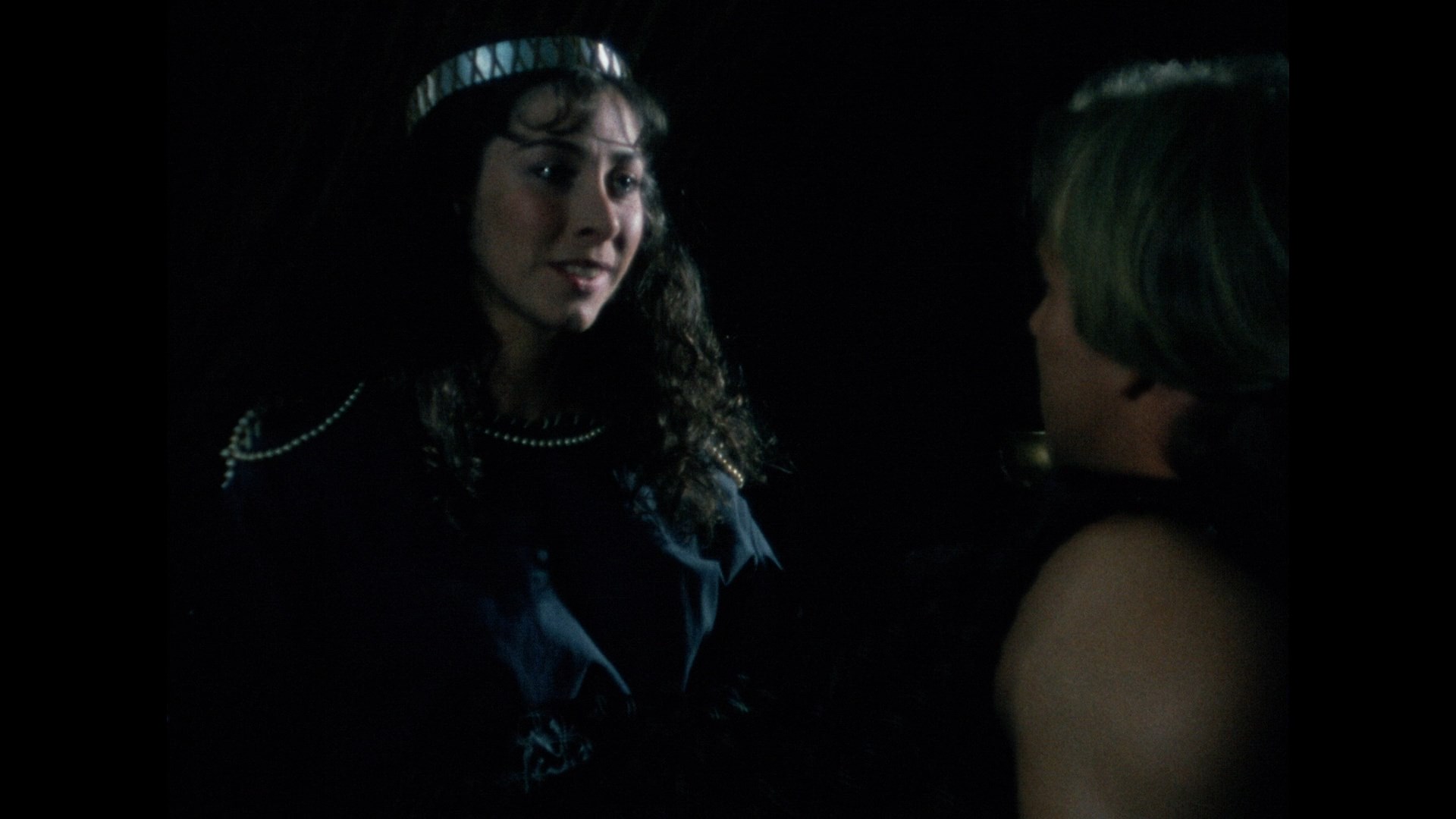 At least in the original version, it also has an effective synth score that occasionally recalls Tangerine Dream's The Keep.
At least in the original version, it also has an effective synth score that occasionally recalls Tangerine Dream's The Keep. in two versions: the original cut (108m11s) in a 2K restoration from film with occasional SD inserts for missing material, or a revised video version (101m29s) with a different score. The gist is the same here with the usual torchlight and dark, moody lighting evoking the Dark Ages on a budget, here restructured a bit with Tristan (Scott Wright) introducing his story as he fears he's approaching death. The air of tragic, windswept adulterous romance is still potent here with Murphy showing a fine theatrical flair for costumes and masks, making for an interesting progression in what ultimately amounts to a trilogy of variations on a theme. Extras include a very cozy Horror-on-Sea festival interview with Murphy (64m13s) about his career complete with glasses of wine and Christmas decor, behind the scenes of The Rite of Spring (40m20s) including lots of scene-stealing sheep, alternative titles and credits for Tristan, trailers for both films, an image gallery for both films, and a Tristan script gallery.
in two versions: the original cut (108m11s) in a 2K restoration from film with occasional SD inserts for missing material, or a revised video version (101m29s) with a different score. The gist is the same here with the usual torchlight and dark, moody lighting evoking the Dark Ages on a budget, here restructured a bit with Tristan (Scott Wright) introducing his story as he fears he's approaching death. The air of tragic, windswept adulterous romance is still potent here with Murphy showing a fine theatrical flair for costumes and masks, making for an interesting progression in what ultimately amounts to a trilogy of variations on a theme. Extras include a very cozy Horror-on-Sea festival interview with Murphy (64m13s) about his career complete with glasses of wine and Christmas decor, behind the scenes of The Rite of Spring (40m20s) including lots of scene-stealing sheep, alternative titles and credits for Tristan, trailers for both films, an image gallery for both films, and a Tristan script gallery.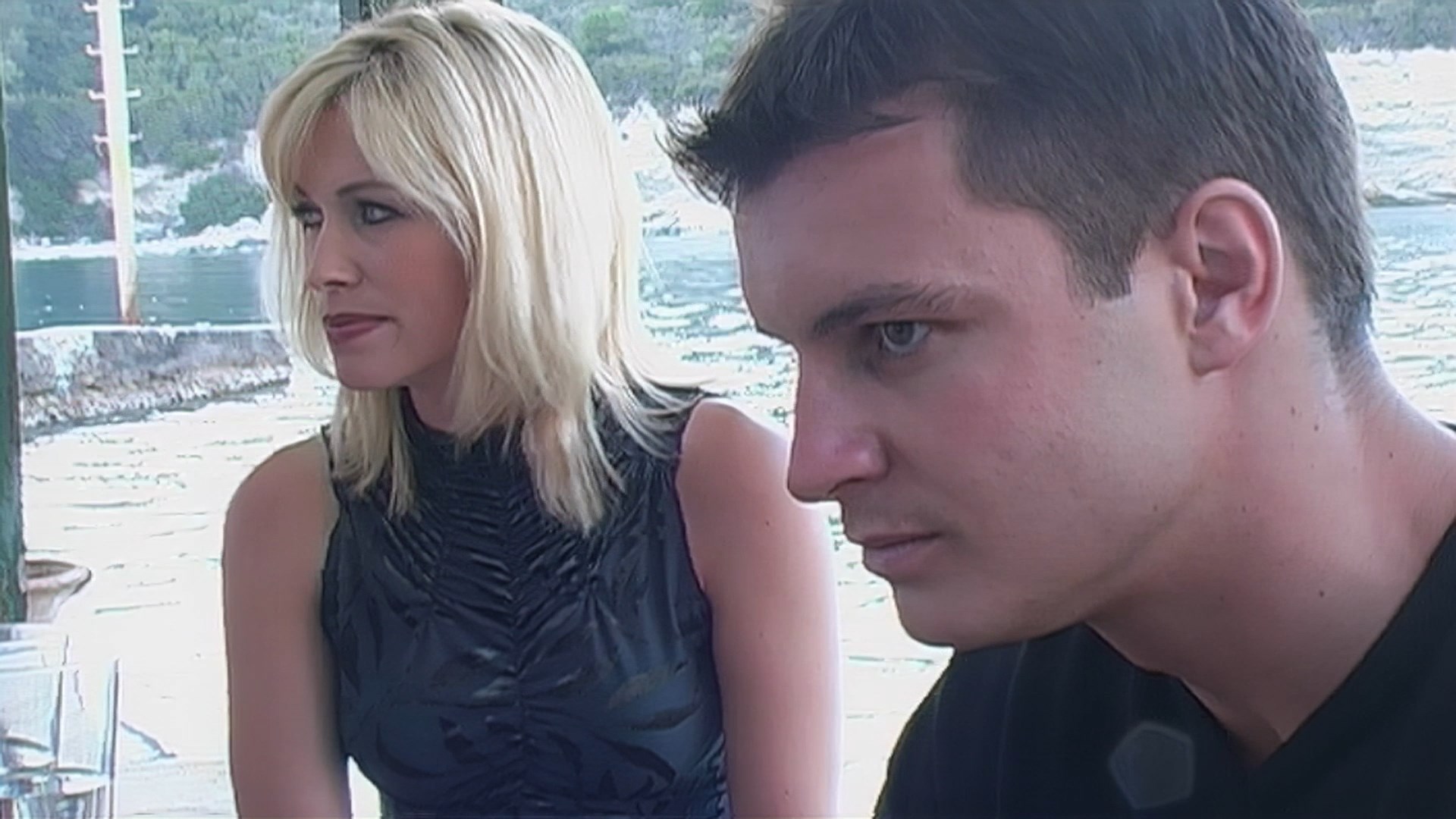 Starting with disc nine, we find Murphy moving in the same direction taken by many
Starting with disc nine, we find Murphy moving in the same direction taken by many 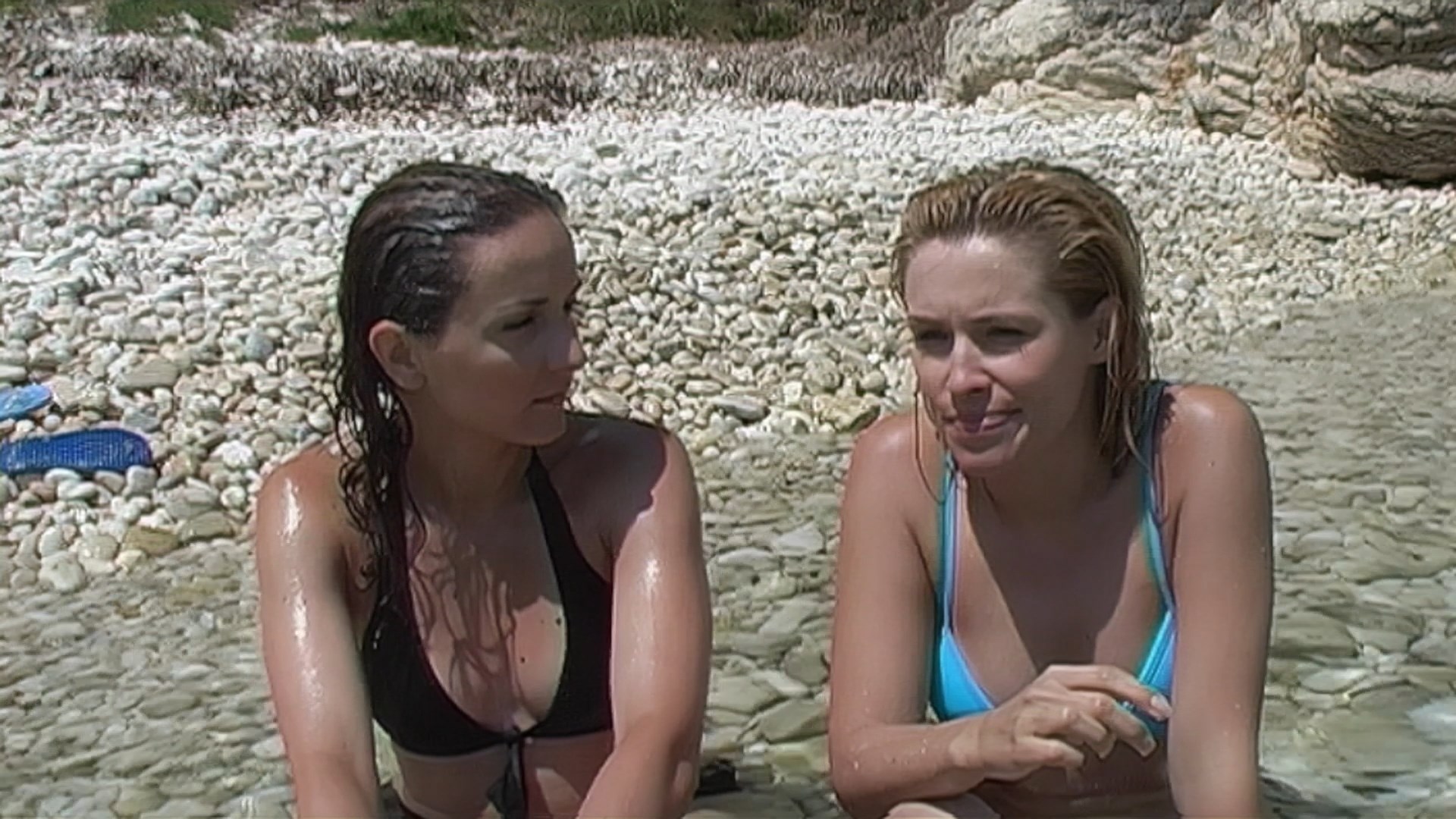 other filmmakers around this time: the shift to shooting on video. Your tolerance for the limitations of the format, especially in its early days with wonky brightness levels and mediocre in-camera sound, will determine how much you get out of these; however, Murphy's DIY approach actually yields a couple of interesting and (in their own way) satisfying thrillers here. 2004's Roxi (96m14s) goes back to the format of a Greek island thriller with a missing person and murderous schemes boiling between a very limited cast of characters. In this case, the intrigue revolves around Roxi (Mary-Anne Barlow) who's married a much older, much richer business executive, Charles. After relocating to an island home, she arranges to meet her husband and, for the first time, his very Scottish-accented grown son, Sean (Ross Maxwell). When Sean shows up by himself and Charles is nowhere to be found, Roxi starts to wonder if there's something more nefarious at play -- especially when a murder is committed nearby. As you'd expect, Murphy is still tipping his hat to those double whammy Hammer thriller twists here, all blasted in bright Greek sunlight and climaxing with one reversal after another. The two leads are actually quite good (especially Maxwell who went on to a very busy career), and had it been shot on film, this might have had a better shot than the very meager distribution it received at the time. Both of the films on this disc were shot in standard definition 16:9 video and look it, so adjust your expectations accordingly.
other filmmakers around this time: the shift to shooting on video. Your tolerance for the limitations of the format, especially in its early days with wonky brightness levels and mediocre in-camera sound, will determine how much you get out of these; however, Murphy's DIY approach actually yields a couple of interesting and (in their own way) satisfying thrillers here. 2004's Roxi (96m14s) goes back to the format of a Greek island thriller with a missing person and murderous schemes boiling between a very limited cast of characters. In this case, the intrigue revolves around Roxi (Mary-Anne Barlow) who's married a much older, much richer business executive, Charles. After relocating to an island home, she arranges to meet her husband and, for the first time, his very Scottish-accented grown son, Sean (Ross Maxwell). When Sean shows up by himself and Charles is nowhere to be found, Roxi starts to wonder if there's something more nefarious at play -- especially when a murder is committed nearby. As you'd expect, Murphy is still tipping his hat to those double whammy Hammer thriller twists here, all blasted in bright Greek sunlight and climaxing with one reversal after another. The two leads are actually quite good (especially Maxwell who went on to a very busy career), and had it been shot on film, this might have had a better shot than the very meager distribution it received at the time. Both of the films on this disc were shot in standard definition 16:9 video and look it, so adjust your expectations accordingly.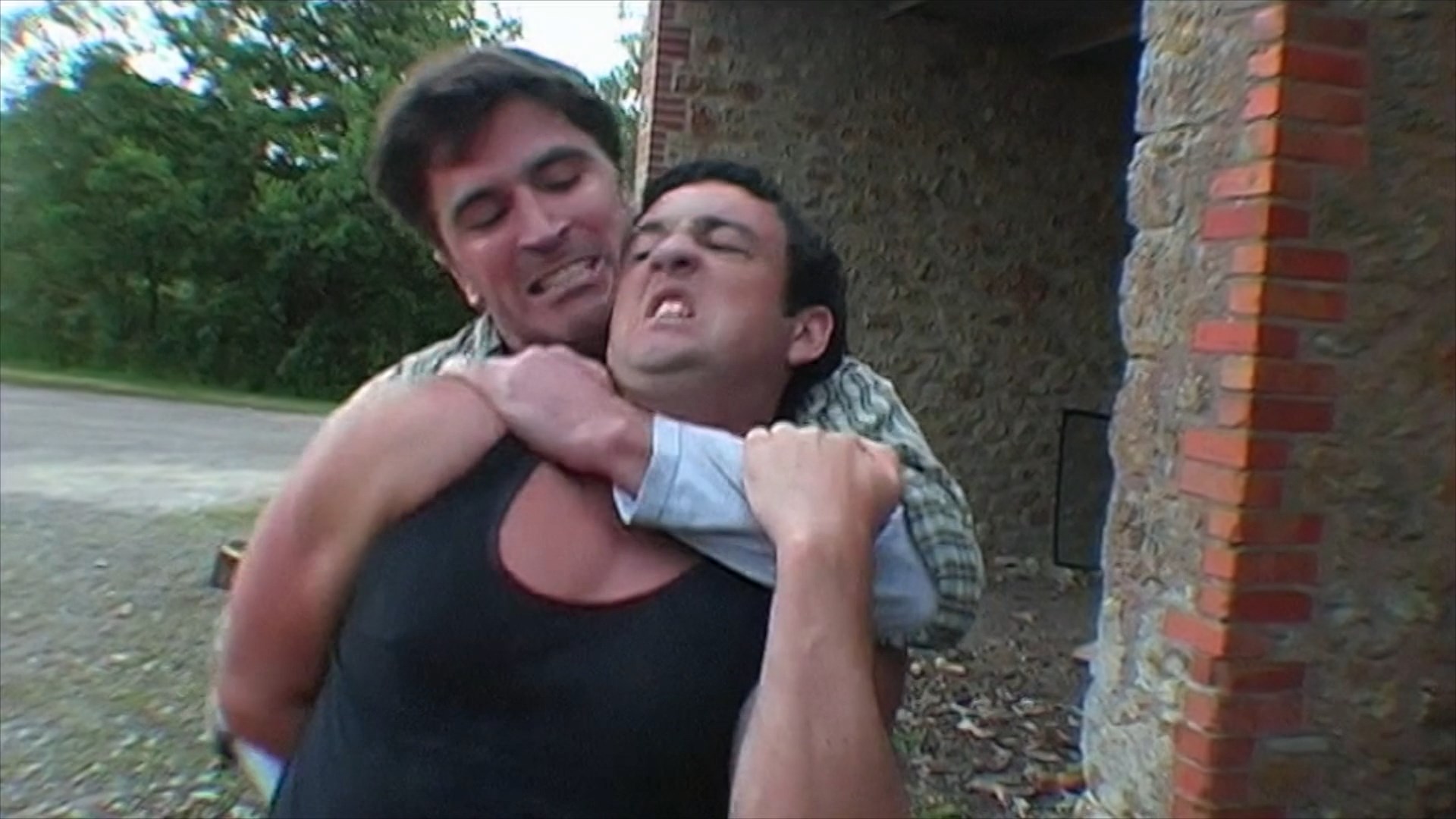 Dan gets invited in by the "caring" Martha who plies him with healthy and nutritious food aplenty when she isn't spying on him in the shower. Her organic regimen also includes getting Dan to work
Dan gets invited in by the "caring" Martha who plies him with healthy and nutritious food aplenty when she isn't spying on him in the shower. Her organic regimen also includes getting Dan to work 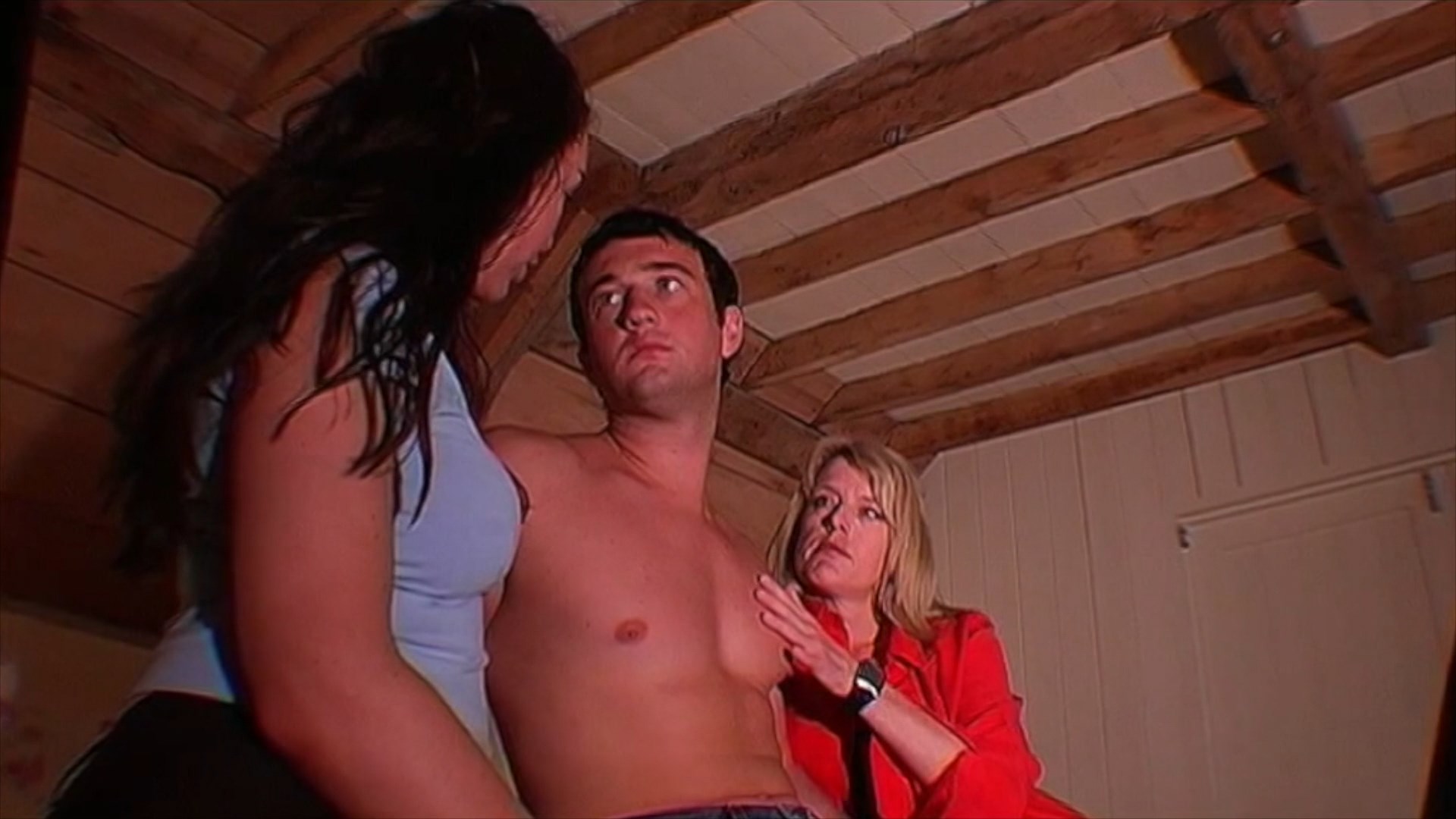 out rigorously, and she isn't even bothered that he's actually an escape from a nearby insane asylum. Of course, the fact that the house is filled with odd nooks and crannies including what looks a wooden mystery room filled with chains couldn't possibly be connected with the club's mysterious meat supply, could it? And when Dan starts getting too close to the club's beautiful manager next door, how is Martha going to react? Macabre and darkly comic, this is an amusing time killer where the objectification of its male lead fits perfectly with the tone of the story, and Holding is a lot of fun with the lion's share of juicy dialogue. Again the video production values are very low and will make this primarily enjoyable for SOV fans, but it's a solid enough project loaded with Murphy's usual preoccupations. Extras include a Skare commentary with Murphy and Holding from 2009's DVD release, "The Making of Roxi" (12m50s), Roxi outtakes (27m39s), "The Making of Skare" (14m42s), a Skare alternative opening and credits (3m26s) from an earlier cut in 2007, Skare outtakes (13m34s), and a really fun Skare script read-through (46m19s), trailers for both films, and image galleries for both films, scripts for Roxi and both versions of Skare, and the original Skare source short story. Particularly interesting is a subsection devoted to the lost 2001 earlier version of Skare including existing silent rushes (36m37s), a 2m50s reel of surviving "leftover" clips from the 2009 Sarcophilous DVD, fight rehearsal footage (2m23s), selected 5m34s commentary by actor Oliver Price about the lost film and its benefits to his wood-chopping skills, and Murphy on Jupp's Beast (4m28s), comparing it to the original script and the notable variations.
out rigorously, and she isn't even bothered that he's actually an escape from a nearby insane asylum. Of course, the fact that the house is filled with odd nooks and crannies including what looks a wooden mystery room filled with chains couldn't possibly be connected with the club's mysterious meat supply, could it? And when Dan starts getting too close to the club's beautiful manager next door, how is Martha going to react? Macabre and darkly comic, this is an amusing time killer where the objectification of its male lead fits perfectly with the tone of the story, and Holding is a lot of fun with the lion's share of juicy dialogue. Again the video production values are very low and will make this primarily enjoyable for SOV fans, but it's a solid enough project loaded with Murphy's usual preoccupations. Extras include a Skare commentary with Murphy and Holding from 2009's DVD release, "The Making of Roxi" (12m50s), Roxi outtakes (27m39s), "The Making of Skare" (14m42s), a Skare alternative opening and credits (3m26s) from an earlier cut in 2007, Skare outtakes (13m34s), and a really fun Skare script read-through (46m19s), trailers for both films, and image galleries for both films, scripts for Roxi and both versions of Skare, and the original Skare source short story. Particularly interesting is a subsection devoted to the lost 2001 earlier version of Skare including existing silent rushes (36m37s), a 2m50s reel of surviving "leftover" clips from the 2009 Sarcophilous DVD, fight rehearsal footage (2m23s), selected 5m34s commentary by actor Oliver Price about the lost film and its benefits to his wood-chopping skills, and Murphy on Jupp's Beast (4m28s), comparing it to the original script and the notable variations. 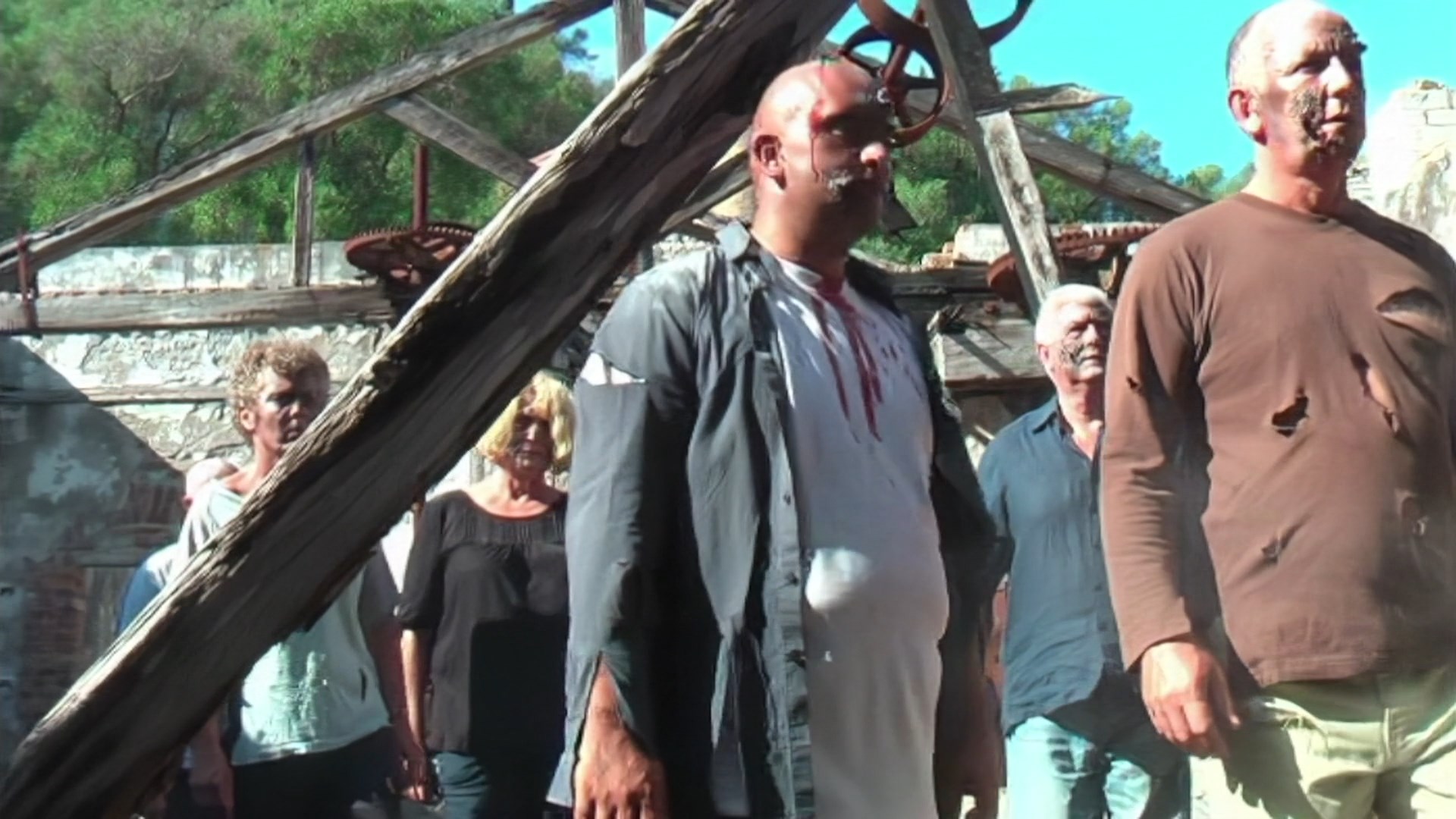 into a very tacky, critically derided film. With a sequel now in the works, he's chipping away on his latest novel and trying to identify his mysterious
into a very tacky, critically derided film. With a sequel now in the works, he's chipping away on his latest novel and trying to identify his mysterious 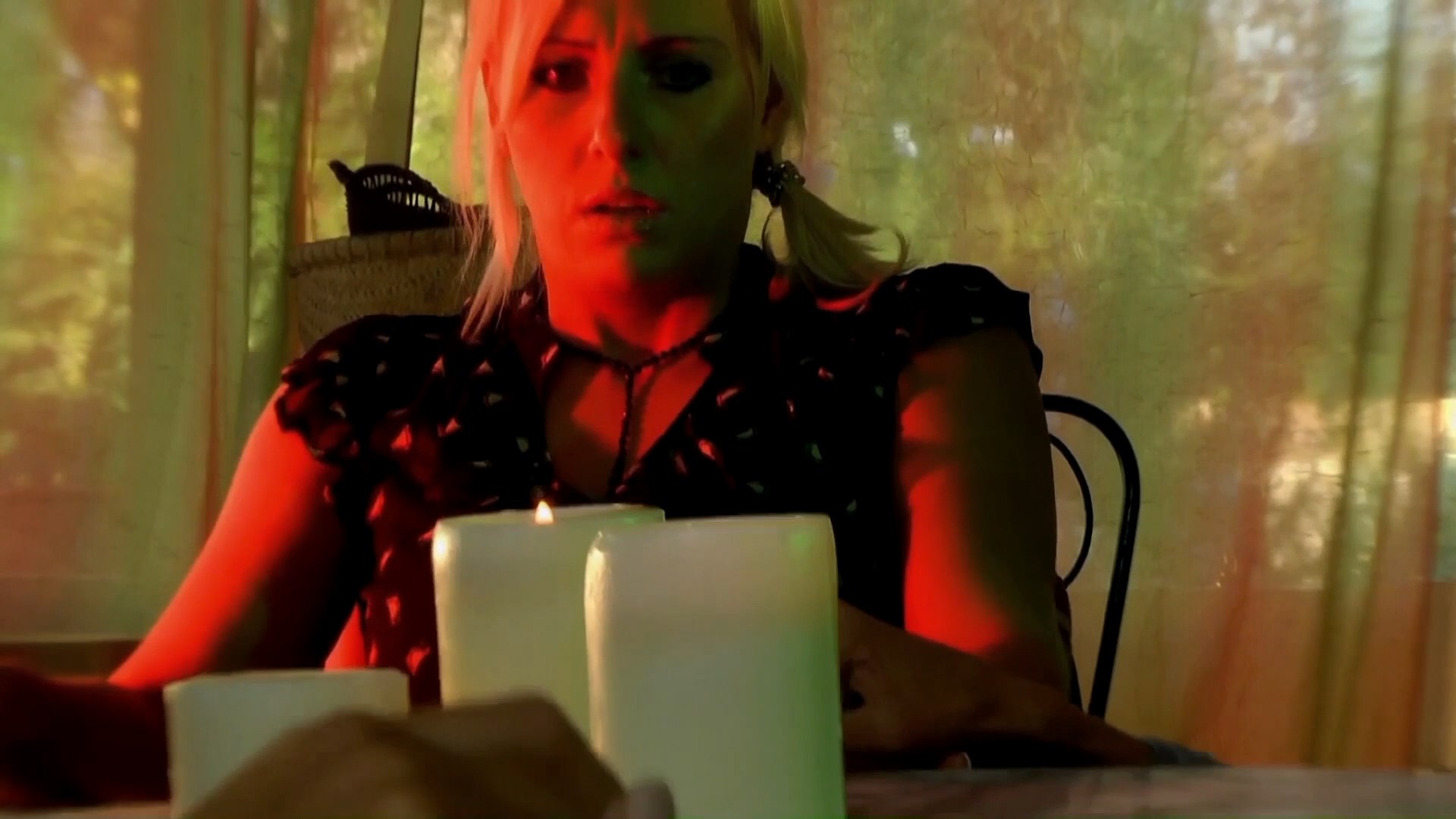 medical "condition" that hasn't really been pinpointed yet. In between hilariously low-rent snippets of the film itself (with May popping up again as the lead), the written page starts to filter into reality -- or perhaps something in the writer's past is actually at work leading to potential destruction. With actors playing multiple roles and constant switching between the Greek setting and the pulpy zombie knight saga, it's a goofy but ambitious idea that finds Murphy once again commenting on the more exploitative side of the creative process. Even more Greece-crazy is 2014's Nekros: Isle of the Dead (97m3s), which is shot in HD and looks significantly slicker. Left to her own devices by her boyfriend and unsettled by a painting in her apartment, Ellie (Natalie Morgon) wraps up her latest season as a tour guide for Nekros Travel by working an elaborate dinner party where everyone's dressed up as Greek deities. Unfortunately it comes to an end when a man turns up dead at the punch table, so she goes to fetch help from a nearby philosophy doctor (Lyndon). With their transpiration options cut off by a quarantine, the guests are soon dying off in quick succession for reasons that only gradually become clear as we drifts between a slasher story and the supernatural. Framed by an interview conducted by Ellie and a police inspector (Olliver), it's a dirt cheap but sometimes poetic oddity that features the expected multiple plot turns at the end flipping everything upside down.
medical "condition" that hasn't really been pinpointed yet. In between hilariously low-rent snippets of the film itself (with May popping up again as the lead), the written page starts to filter into reality -- or perhaps something in the writer's past is actually at work leading to potential destruction. With actors playing multiple roles and constant switching between the Greek setting and the pulpy zombie knight saga, it's a goofy but ambitious idea that finds Murphy once again commenting on the more exploitative side of the creative process. Even more Greece-crazy is 2014's Nekros: Isle of the Dead (97m3s), which is shot in HD and looks significantly slicker. Left to her own devices by her boyfriend and unsettled by a painting in her apartment, Ellie (Natalie Morgon) wraps up her latest season as a tour guide for Nekros Travel by working an elaborate dinner party where everyone's dressed up as Greek deities. Unfortunately it comes to an end when a man turns up dead at the punch table, so she goes to fetch help from a nearby philosophy doctor (Lyndon). With their transpiration options cut off by a quarantine, the guests are soon dying off in quick succession for reasons that only gradually become clear as we drifts between a slasher story and the supernatural. Framed by an interview conducted by Ellie and a police inspector (Olliver), it's a dirt cheap but sometimes poetic oddity that features the expected multiple plot turns at the end flipping everything upside down. 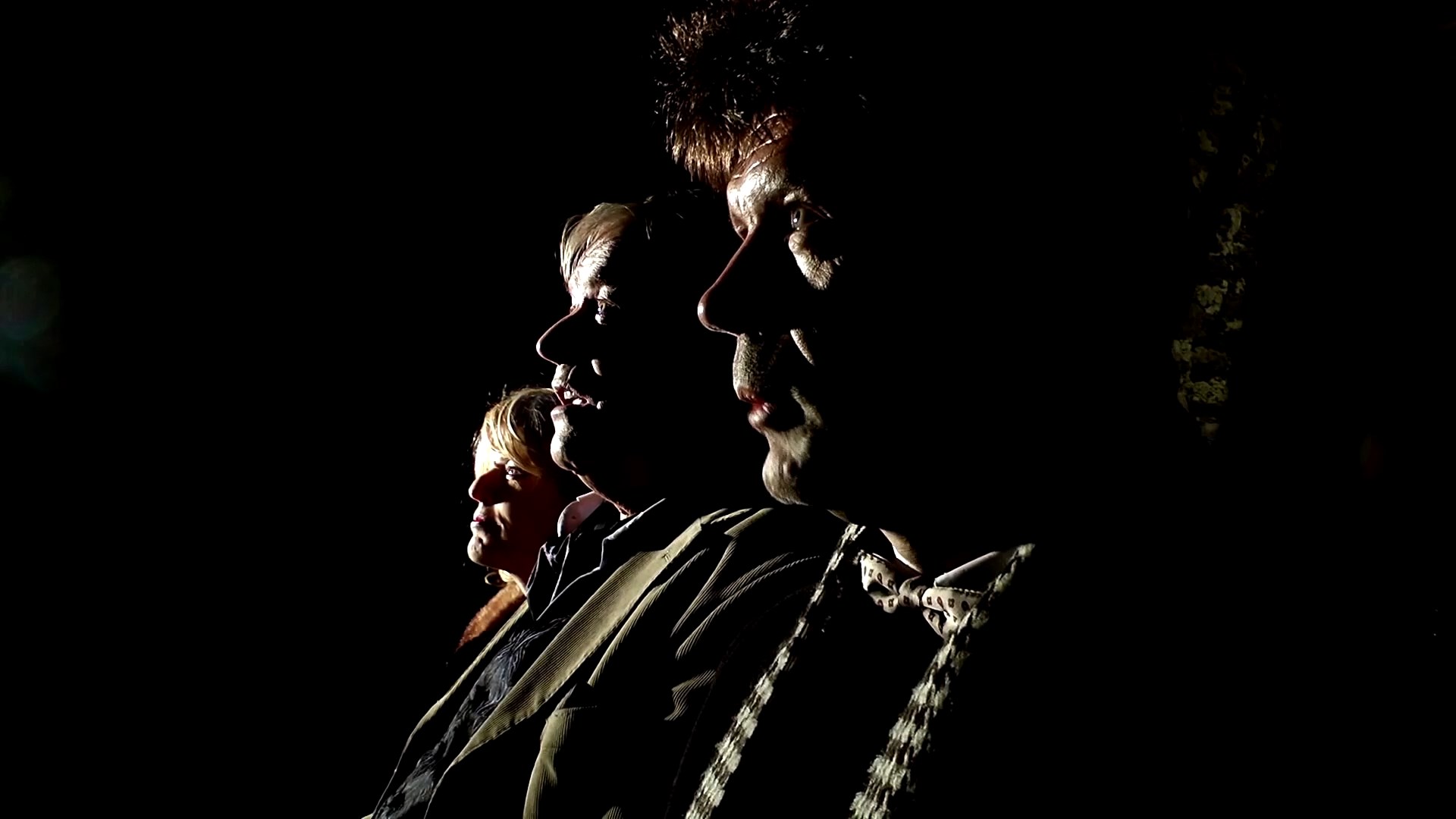 named Alan Strange. At a bitchy New Year's Eve party in Dartmoor in 1989, he ends up spending time with the actor who assumed the same role, Alexander Beck (Lyndon), as well as his ex-wife Gaye (Holding) who's penned a tell-all book about their lives. Meanwhile preparations are afoot for a one-off theatrical production in a barn involving a young actor who might be appearing in a Strange reboot, and he's caught Peter's eye for the evening. Loaded with tart dialogue and quite gentle given the subject matter, this may not have been intended as a swan song but does play nicely as one including some poignant shots of Olliver looking at ephemera from his own appearances for the director. Given how treacherous show business was depicted in some of the other films in this set, it's also nice to see everyone involved just kicking back and having fun with a tale about coming to peace with one's life and nature. The last batch of extras here starts with "Murphy’s Lore, Part 3: Legacy" (24m56s), a bittersweet look at Murphy's legacy among the local indie horror scene featuring comments from many colleagues including Jupp, Stephen Longhurst, filmmakers Jackson Batchelor, Sam Mason Bell and Tom Lee Rutter, and film historians Darrell Buxton and Johnny Walker. "The Making of ZK3" (11m20s) covers the project's origins as Zombie Knights and its evolution to what we have today, presented by Murphy and featuring interviews with Holding and Lyndon. Also included are ZK3 premiere coverage from the Paxos Film Awards in 20212 (10m33s), the final version (16m17s) and rough assembly (53m19s) of the Nekros behind the scenes, a goofy "Phil Lyndon: Wish You Were Here" (3m1s) promo video from Loggos, a pick-up take (35s) and green screen test (37s) from The Return of Alan Strange, trailers for all three films, a 40-image gallery, and a ZK3 script gallery. Limited to 6,000 units, the box also comes with an exclusive 120-page book with essays by Wayne Maginn, Paul Higson, Buxton, and Walker, a comprehensive filmography, and film credits. Needless to say, it's a truly one-of-a-kind feat among home video releases and absolutely worth picking up if you'd like to see a previously unexplored wing of British outsider cinema.
named Alan Strange. At a bitchy New Year's Eve party in Dartmoor in 1989, he ends up spending time with the actor who assumed the same role, Alexander Beck (Lyndon), as well as his ex-wife Gaye (Holding) who's penned a tell-all book about their lives. Meanwhile preparations are afoot for a one-off theatrical production in a barn involving a young actor who might be appearing in a Strange reboot, and he's caught Peter's eye for the evening. Loaded with tart dialogue and quite gentle given the subject matter, this may not have been intended as a swan song but does play nicely as one including some poignant shots of Olliver looking at ephemera from his own appearances for the director. Given how treacherous show business was depicted in some of the other films in this set, it's also nice to see everyone involved just kicking back and having fun with a tale about coming to peace with one's life and nature. The last batch of extras here starts with "Murphy’s Lore, Part 3: Legacy" (24m56s), a bittersweet look at Murphy's legacy among the local indie horror scene featuring comments from many colleagues including Jupp, Stephen Longhurst, filmmakers Jackson Batchelor, Sam Mason Bell and Tom Lee Rutter, and film historians Darrell Buxton and Johnny Walker. "The Making of ZK3" (11m20s) covers the project's origins as Zombie Knights and its evolution to what we have today, presented by Murphy and featuring interviews with Holding and Lyndon. Also included are ZK3 premiere coverage from the Paxos Film Awards in 20212 (10m33s), the final version (16m17s) and rough assembly (53m19s) of the Nekros behind the scenes, a goofy "Phil Lyndon: Wish You Were Here" (3m1s) promo video from Loggos, a pick-up take (35s) and green screen test (37s) from The Return of Alan Strange, trailers for all three films, a 40-image gallery, and a ZK3 script gallery. Limited to 6,000 units, the box also comes with an exclusive 120-page book with essays by Wayne Maginn, Paul Higson, Buxton, and Walker, a comprehensive filmography, and film credits. Needless to say, it's a truly one-of-a-kind feat among home video releases and absolutely worth picking up if you'd like to see a previously unexplored wing of British outsider cinema.![]()